

Fun Writing Activities for Middle School
Share with your friends!
Does your middle schooler heave a sigh when it’s time for writing?
Add some appeal to the subject of writing with these fun writing activities for middle school.

Writing Activities for Middle School
The six types of writing are descriptive, expository, persuasive, technical, and poetic. (I know, I know, your middle schooler is nodding off already.)
The truth is these writing types can be enjoyable if you have some fun topic ideas.
Not only does it make writing fun, but it also gives students a chance to practice those dreaded middle school spelling words that they need to master.
Read on for some writing activities that are fun and (ssh! Don’t tell!) educational.
This article contains affiliate links to things that you might like.
Descriptive Writing Activities for MIddle School
As the name implies, descriptive writing describes something.
You want to create mental pictures for your reader so they can see in their mind’s eye exactly what you are describing.
This writing style can be a delight to compose if you like the topic, so pick one that resonates with your student.
Describe the car of the future
Use your imagination to describe all the amazing features it will have. What will it look like?
Imagine an alien is your pen pal
How would you describe yourself so your alien friend knows what you look like?
Describe the ideal pet
Some people love hamsters, and others love hounds.
Some adore cats, while others keep chameleons.
What is your ideal pet? Describe it in detail.
What does it feel like? Look like? Eat? How does it act?
Expository Writing Activities for Middle School
Expository writing gives information, but it does so in a different way from descriptive writing.
It is all about the facts and lacks flowery language.
Like a newspaper article, it investigates an idea, subject, or event.
Newspaper articles written by dogs
Imagine there is a secret underground dog newspaper that dogs write and distribute that tells the news of the day from their perspective.
Write an article for that paper as a doggie journalist.
Consider possible titles like “Scuffle at the Dog Park,” “Duck Befriends Dog,” or “Frisbee Competition Wows All.”
Compare and contrast the best and worst pizzas
Everyone has an opinion on pizza. Compare your favorite pizza with your least favorite.
Consider all the elements: size, crust, temperature, and toppings.
Write a how-to
Topics could be how to be happy, how to play Minecraft, how to be a good friend, how to make perfect pancakes, or anything else you know how to do (or would like to think through how to be).
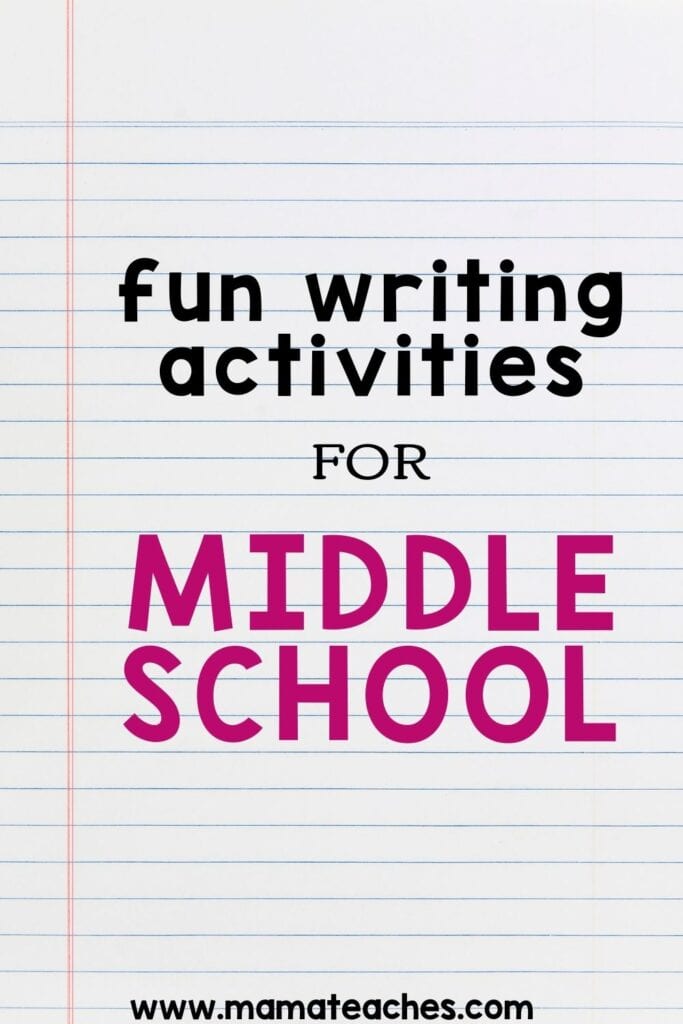
Persuasive Writing Activities for Middle School
Ah, middle schoolers, how they love to argue. Channel that natural proclivity to argue into persuasive writing.
Whether children should have chores
Let them choose pro or con (can you imagine a child choosing pro?).
Whether parents should limit their kids’ screen time
Consider having them outline both pro and con and choose one to write about.
It’s always good to think through both sides before you write about one.
Whether companies should market their products to kids
Aren’t you curious as to which side your student will pick?
Technical Writing Activities for Middle School
Some students say they are not good writers because they dislike creative writing, but your logical, detail-oriented students will shine doing technical writing.
Although this writing style is, well, technical, you can introduce it in middle school.
Write a manual on how to use a certain phone app or device
My son has to show me how to manage the settings on my Roku, so he could write me a manual for that…
Create a sales pitch brochure
Imagine a product you invented, and write a brochure convincing someone to buy it.
Be informative and persuasive. You can include pictures!
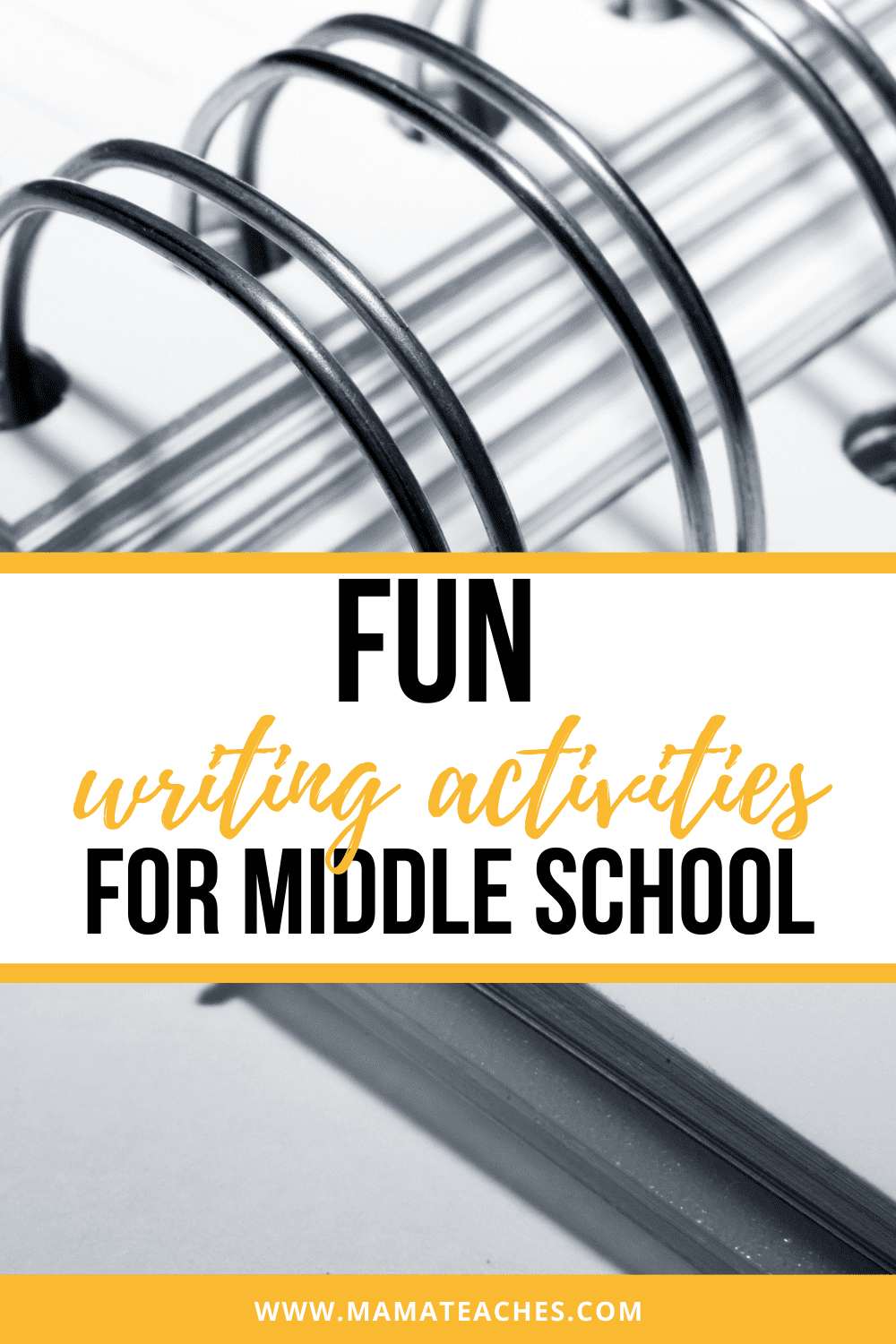
Poetic Writing Activities for Middle School
Children were raised on poetry (think of Dr. Seuss), so although writing poetry may seem like a daunting task to some, they have already been steeped in it.
Reawaken the poetic with these poetry activities.
Think of a word or phrase like “SUMMER” and write it vertically down the page.
Then compose a line that starts with each letter. For example, “Sunny, unstructured, magazines at the beach, etc…”
Haikus are three-line poems that have 5 syllables in the first line, 7 in the second, and 5 in the third.
They are traditionally about nature.
These tiny poems can be fantastic first poems for the poetry intimidated.
Texting poem (or poem for two voices)
Write a poem that can read like a text conversation between two people
Middle School Writing Activities
Not every writing assignment has to be a five paragraph essay. Writing should be fun and personal as well as educational and informative. Keep it fun and fresh with these fun writing activities for middle school.
You May Also Like:
- Teaching Creative Writing
- Online Middle School Writing Program
- Teaching Writing: Ways to Say Said
This site uses Akismet to reduce spam. Learn how your comment data is processed .

100 Creative Writing Prompts for Middle School
Share this post!
Looking for some inspiration for your next short story? Look no further! We’ve compiled a list of 100 creative writing prompts for middle school to help you get started. Chose your favorite story idea from the list of creative writing prompts below and get started right now.
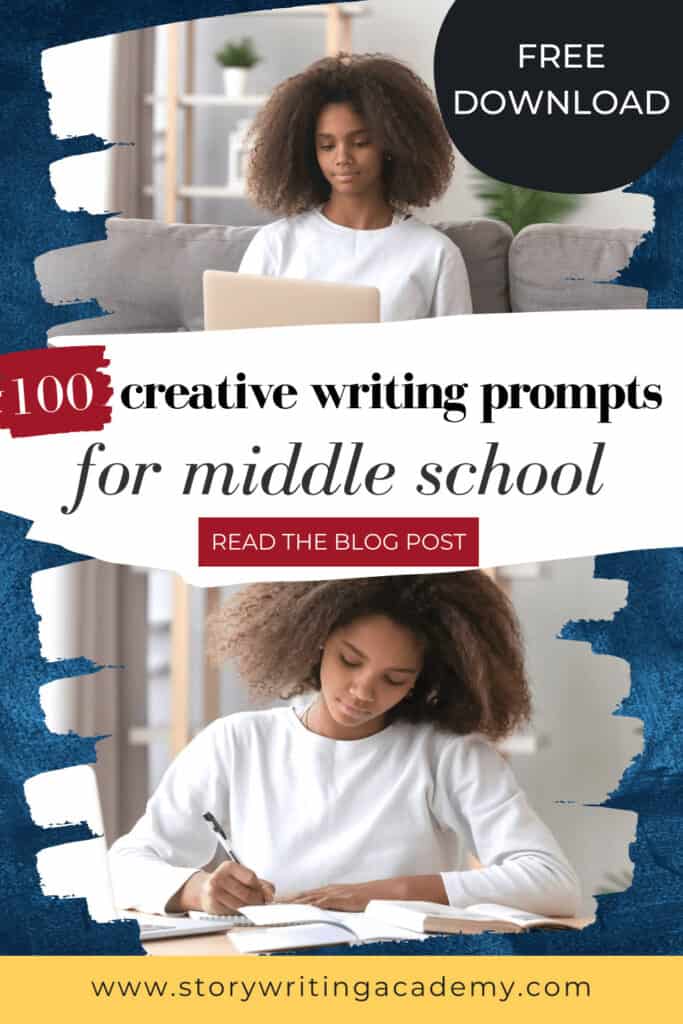
Why Story Starters and Writing Prompts Work
Writing is a complex skill. Not only do the hands of middle school students still cramp up when they write for more than a nanosecond, but they have to synthesize many new writing skills at once.
Young writers must generate creative writing ideas, assess their ideas to choose the best one, determine a compelling beginning, middle, and end, outline their story, write several drafts, and edit their own work. These are all necessary skills that must be developed, yes, but if we can isolate them, focusing on one or two at a time, we make it easier for middle school children to conquer each skill.
With writing prompts, they have lots of fun writing ideas to choose from. This takes away the stress of having to come up with their own high-concept idea. (And while these prompts only help with writing-induced stress, we recommend these tips for how to relieve stress in general. Being stressed doesn’t go well with creative writing.)
When they have a starting point to work from, writing gets a lot easier. Instead of spending a long time feeling frustrated about a lack of ideas, students can jump right in and write their first sentence. Even reluctant writers tend to get more excited about writing when presented with irresistible story-writing prompts.
In short, the best thing about using these fun writing prompts is that middle schoolers are more likely to fall in love with writing when they have a great time doing it.
Who Should Use These Story Writing Prompts
While these have been prepared with middle school and high school students in mind, many of them are also applicable to adult writers. Most of the prompts below will be too advanced or complex for most elementary school students, though some older kids from the lower grades, especially those with a real passion for writing, might find a few that peak their interest.
To make things a little simpler for you, we’ve also included a free printable version of these prompts that you can grab by entering your information below.

Sign Up for Your FREE Printable Story Starters and Writing Prompts
You have successfully joined our subscriber list.
Writing Prompts for Stories That Start Out Just Like Any Other Day
- I tiptoed into the bathroom. If anyone caught me doing this, I’d be in big trouble. I grabbed my mother’s lipstick and brought it back to my bedroom where my brother slept…
- I peeked through the curtains. There was a limo parked outside with two bodyguards. I heard a knock at the door…
- I went over to say hello to the cute little baby under the umbrella, but when I reached her, I saw that…
- The bell rang, and I sprinted toward my locker. I had to get out of there before…
- I opened the front door to find the UPS man standing on the front stoop, his arm around a cylindrical package that was almost as tall as him. Oh no. Not again, I thought…
- Irene gripped her mom’s hand harder as they walked through the doors of the imposing gray building. Her mom had promised her they’d never have to come here again, but…
- The lights dimmed and the curtains opened. I felt like I was going to throw up. Why had I ever thought this was a good idea?…
- As soon as I boarded the train, I began my letter to my sister. I did it. I sold everything and am on my way to…
- A kid’s birthday party seemed like an innocent enough place to blend in and relax for a moment. It’s been a while since I stopped moving. But when the balloon popped…
- I sat down at my desk and sifted through the mail that had been placed in front of my computer. All junk, of course. I was about to dump it all in the recycling bin when I saw my favorite magazine at the bottom of the pile. Tossing the rest aside, I snatched it up, but something unexpected fell out from between the pages…
- We were canoeing across the inlet when we noticed some unusual movement alongside the boat. A whale was surfacing next to us. Another one followed closely behind. Suddenly, our boat was being lifted out of the water and…
- The Instagram account I created for my hamster just went viral and he’s getting calls with job offers from around the world, only …
- At first, we thought the box contained the water guns we ordered online, so we tore it open eagerly, ready to load them up. Instead, what we saw inside completely changed everything.
- I got off the boat furious and trembling. I was never getting back on there again, not with him at least. There was no way I was going to let him…
- The pancakes were perfect—round and golden, soft but a little crispy near the edges. I slathered them in maple syrup and fruit. But then mom went to the fridge and took out the whipped cream, giving me an apologetic look as she did so. It was a treat, a very special one, and she only ever brought it out if…
- We sat around the campfire in eerie silence, nobody wanting to bring up our predicament. Everything was going to have to come out anyway, we might as well get it over with. I was just about to clear my throat when I noticed Sam and Layla standing apart from the group, whispering. What were they plotting now?
- I’d always wanted to be brave like my brother Simon. He wasn’t afraid of anything. I remember once, when he was younger, he…
- We walked through the garden one last time, knowing we’d never return to this house again. I waved goodbye to each flower bed, to the apple tree that I’d climbed innumerable times as a child. I wanted to scream. Why were they making me…
- My dad used to tell me these crazy stories when I was a kid. His life seemed so bizarre to me, but his sense of humor was mysterious, like I could never tell when fact blended into fiction. I still don’t know which ones to believe, like that one about…
- Shivering, I tried to open the door of my car, but it was frozen shut. I looked up and scanned the parking lot to make sure nobody had seen me. Why did it have to be this freezing, today of all days? What if they…
You might also enjoy: How to Use Story Starters to Get Kids Writing
Writing Prompts for Stories That Start with Dialogue
- “Drink it, quick!” I looked at the bottle. The contents were unlike any I’d ever seen. I closed my eyes and drank it in one gulp…
- “Five more minutes,” my dad grunted, as I tried to pull him out of bed. “Dad, they’re here–we have to go!”
- “Shh…” I said frantically, as Robin’s wheelchair squeaked again. “Don’t you know how much trouble we’ll be in if they find us…”
- “Put me down!” I yelled as I was hoisted into the air by a giant…
- “Stop it!” I cried as my little sister snatched my phone from the desk and tried to eat it. I couldn’t run the risk of anyone seeing the words I’d etched into the back of it, the ones that would save my life if anyone ever…
- “Have you ever driven one of these before?” I asked James, trying not to let him see how nervous I was. “Is it safe?”
- “Are you coming or not?” he demanded as he took a few steps further into the…
- “Is there anyone in there?” I wondered aloud, staring up at the gothic castle. “The letter said they’d meet us…”
- “We finally did it!” I exclaimed to my lab partner. “We’ve invented a cream that actually makes people more beautiful. We are going to be so rich!”
- You have just five dollars to your name, and you decide to spend it on lunch at your favorite fast food joint. Just as you’re about to pay, a boy not much older than you leans in and whispers to you, “Hold onto your money. I’ll show you how to turn that five dollars into five grand.”
- You’re standing in line at a coffee shop when you spot a shiny coin on the ground. You bend down to pick it up, but a big black boot stomps down on it just before your fingers grasp it. “I wouldn’t do that if I were you,” a deep voice warns.
- “I’m sorry to be the bearer of bad news,” she began, her arms crossed nervously over her chest. “You didn’t get in.” When I raised my eyebrows at her, she added, “And there’s more…”
- He patted my hand reassuringly and said, “It’s okay, you can trust me,” in that voice of his that I’d learned meant I really couldn’t. “All you have to do is…”
- “It’s for you!” she called, after answering the phone. When I went to take it from her, she covered the mouthpiece and whispered menacingly, “This better not be about what I think it’s about, got it?”
- “I should have listened to you,” Greg acknowledged, as he lay curled up on the grass, his clothes caked in mud. “You were right about…”
- “How could you?” I asked in disbelief. “After everything we’ve been through, I thought you were the one person I could trust. I can’t believe you…”
- I kicked at the dust with my shoe. Her question had caught me off guard. I wasn’t prepared to answer it, not yet. I tried to stall. “Remember that time when…”
- “Okay, okay, I’m here,” I said, rolling my eyes for effect. “What was this important news that you had to drag me away from pizza night for?”
- “It’s okay, you can come out, you don’t have to be afraid. Here, take my hand.” The hand that reached out toward me was like any I’d ever seen before.
- “Let go!” I screamed at the man holding me in a headlock. I tried to kick his shins, but he just grunted and held tight. Think quick , I told myself. Time is running out. If only…
You might also enjoy: 29 Creative Journal Writing Prompts for Teens
Writing Prompts with an Element of Suspense
- Estella ran down the trail, her dog, Gerard, several feet ahead of her. A gust of wind ripped through the forest and a loud crack on her left caught her attention. She watched the tree fall, then turned back to the trail, but Gerard was gone…
- The light started to flicker, first blue, then white. I looked around for a way out, but I was trapped. I guess I’d have to resort to the backup plan…
- The footprints in the snow were fresh. They veered off the path and into the woods. I had to make a choice. It was now or never.
- I tiptoed down the stairs of the prison. I had to break her out of here before…
- It was really hot that day, so I went to my favorite lake. I was about to jump into the cool water when a big splash in the middle of the lake sent ripples over the water. Something was in there. Something…
- My sister and I entered the fairgrounds suspiciously. The note we’d found had said that the mystery person would be here at five, and it was half-past four. We weren’t taking any chances. We had to find him before…
- Ellen squeezed down the narrow aisle of the plane looking for row M. She stuffed her backpack under the seat in front of her with her feet and buckled up. As the plane lifted off the ground, the pilot welcome them aboard their flight to Iceland. Wait, what? This wasn’t the flight to…?
- I walked out of the interview, still holding my breath. This was my dream job and I was afraid that the smallest of breaths would cause me to wake up. I exited the building and a little girl approached me. “The job’s yours,” she said, somewhat prophetically. “All you have to do is…”
- Last night, I was taking a nap on the couch when the phone rang. When I answered it, the voice on the other end said, “Will you accept a collect call from Brazil?” I started to panic, was this the call John has warned me about? I answered it with trepidation…
- It was my seventeenth birthday, and I’d been planning the party for months. Everything was perfect: the decorations were over the top, the food catered by my favorite restaurant, and every cool kid in school was there. The only problem? I was stuck in…
- The shelves in the used bookstore climbed higher than I could see, I’d never seen so many books before in my life. I climbed the rolling ladder to get a better look. Just then, a woman approached and held out a thick, red leather-bound tome. “This is one you seek,” she called out to me. “Look no further. This one will…
- I was sitting at a bus stop when a little girl came up to me and gave me a small box. It started trembling in my hands but when I looked up to ask her what it was, she’d disappeared.
- I tiptoed into the haunted house, looking both ways to see what was in it. As my eyes adjusted to the light, I saw…
- I was about to enter my house when I saw a little dog running down the street toward the busy intersection. There was nobody with him. Without thinking, I took off after him and…
- A loud crash sent me thundering down the stairs to the kitchen. Wolf, my rottweiler was greedily licking lasagna off the tiled floor. Not unusual in and of itself, but what caught my eye was the shiny silver thing glinting underneath the tomato sauce. Was that what I thought it was?…
- It was well past dark and I was the last person in the library. It was eerily quiet, except for a faint tapping sound coming from the next aisle. I moved cautiously toward the end of the row and peeked my head around the corner…
- I was running out of time. They’d said they’d give me until sundown, and that was only a few hours away. I had to…
- That’s odd , I thought to myself as I reached the next landing and glanced up at the next set of stairs. I don’t remember there being another set of stairs here before. Is this what the old man was talking about when he said…
- The computer beeped again. It was now pinging six times per minute. Whoever was sending these messages was getting impatient, and I wasn’t sure I wanted to find out why.
- I woke up yesterday in a tree, without even a sweater to keep me dry. The weird thing is…
You might also enjoy: Fun Writing Activities for Kids
Writing Prompts that Ask “What If?”
- What if every character you wrote automatically came to life and a foreign government was after you to make spies for them?
- What if a family member you’d never met left you a parcel of land in Norway, but when you got there you realized it was an enchanted forest?
- What if your parents came home from work tonight and told you they were sending you to boarding school?
- What if you were eating breakfast alone at your kitchen table when a newscaster interrupted your favorite TV show to break the story of a missing person, and the missing person was you?
- What if you could live in Ikea for a month?
- What if a cruise ship full of celebrities got stuck at sea for two weeks?
- What if you were in a museum and discovered a stack of letters describing the location of a buried treasure in your hometown?
- What if you were cast as the lead in an opera but you’d faked your way into the role and didn’t actually know how to sing?
- What if a child saw her parents stealing, but chose to keep it a secret so that she wouldn’t be separated from them?
- What if someone offered you the gift of being the best painter in the world, but in return, you could never stop painting?
- What if your pet was elected mayor of your city?
- What if you were an Uber driver in a world where people travel by hot air balloon instead of by car?
- What if you found a time machine, traveled back in time to ancient Egypt, and discovered that their world was even more modernized than ours and included more advanced technology but that they’d destroyed all evidence of these advances in an effort to protect future generations from making the same devastating decisions that they had?
- What if a screenwriter approached you about making a movie about your life, but every time she interviewed you, she completely ignored every answer you gave and made up her own?
- What if you could type 1000 words per minute and could write a new novel every hour?
- What if you woke up tomorrow morning speaking five new languages that you’d never heard before, only to discover that you’d been recruited by international spies and they’d filled your brain with secrets and information while you were sleeping?
- What if you could never leave high school, but instead had to keep coming back year after year to try and get perfect grades before you were allowed to move on?
- What if your parents were taking you on a dream vacation to Europe, but they got kidnapped at an airport and you had to navigate new countries on your own while trying to save them?
- What if you invented a new tool that could clean your whole house in fifteen minutes and you became a millionaire overnight?
- What if you were reading a list of writing prompts, and you realized that every sentence that came out of your mouth was, in fact, a writing prompt and that you were compelled to write a story for each one?
You might also enjoy: Poetry Writing Prompts for Kids
Story Starters that will Bend Readers’ Minds
- The answer is 49. I looked around the room. There was nobody else there except Quincey. Could it be?
- It’s all over the news. Random events are taking place. What if someone discovers that it’s my dreams coming true, literally? What will they do to me? I have to find…
- On Saturday morning I went out to the backyard in my slippers and robe to feed my pet rabbits. When I reached their hutch, I gasped. A large hole had been torn in the wire door and the hutch was empty. Fearing the worst, I scanned the yard for signs of their whereabouts, when suddenly I was tapped on the shoulder. I spun around to find a black bear standing in his hind legs. “If you ever want to see your bunnies again,” he said, …
- Never trust your dreams, they will get you in trouble every time. At least, if they’re anything like mine. Maybe trouble has a way of finding me, but still, you need to be safe. Just last week, I had a dream about…
- I’d been tracking him all day, and I almost had him, but I had to wait until he was under a tree before I could pounce. I stood up and scanned the clearing. That’s when I realized that I’d been duped. I wasn’t the stalker, after all. He was the bait, and I was the target.
- A baby sits alone in the plane’s first-class section, bright red headphones perched on his head. He stares at me a moment as I pass, then snaps his fingers at the flight attendant to get her attention. Was this another one of…
- You’re forty years old and are happily married to your spouse of 15 years. You’re offered an opportunity to go back to your childhood and correct a horrible mistake you made, and you accept it. You fix the mistake and continue moving through the stages of your life as you did before. Only, the day you were supposed to meet your spouse for the first time, they never showed up.
- You’re walking down a deserted street downtown when you pass a building with a mural painted on its wall. As you take it in, the faces on the mural suddenly start talking to you, warning you of crimes that are about to occur in the city. You’re unable to shut out their voices or ignore them.
- You’re in the car when the person on the radio starts talking about something you did yesterday. Only, you didn’t actually do it, you only thought about it. And it wasn’t yesterday, it was five minutes ago.
- You discover a book in your parent’s bedroom that describes everything you’ve ever said and done. But the book is a hundred years old, and you’re just twelve. Or so you thought.
- She stepped off the plane looking different from how I remembered her, which was strange as it had only been a few months. But she was taller somehow, her eyes were darker, her features sharper. What had they done to her at that retreat?
- Sometimes I wish I could just get into a waterproof bubble and float away, forever, away from all of this. Leave it all behind and start over. I never actually thought it would be possible, until…
- The house started to shake, and at first, I thought it was an earthquake. We’d trained for those at school. I ran to the nearest door frame and pushed my hands and feet into it as hard as I could. But this wasn’t a normal earthquake. None of the other houses outside were shaking, for one thing. And it went on much too long. As the shaking got more and more intense, a hole opened in the middle of the house, and from it rose…
- I can talk to animals. It’s just something I’ve always been able to do. I didn’t even know it was weird until some kids at school saw me shooting the breeze with a murder of crows at recess one day. Now I have to keep it a secret. If anyone else finds out…
- You’re walking home with your friends from school one day when your best friend vanishes down a manhole. You jump in without thinking and discover that in the sewer lives an entire species of…
- Leonard sat down on the park bench to tie his shoelace. An old man walked up with his dog and asked Leonard if he’d watch the dog for five minutes. The man never returned, and Leonard…
- I walked through the market timidly, unsure of what I was looking for, but somehow feeling sure that I would find it here. A flash of light flickered almost imperceptibly to my right, and instinctively I turned toward the stall that I’d just passed, but it was gone. In its place…
- Yesterday, my mother was turned into a rock. Yes, a rock. The kind that’s small enough to put in my pocket and carry around. In fact, that’s where she is right now. I have one week to figure out who did this and find them if I ever want to see her face again.
- I knew robotics were dangerous. I’ve been warning them for years. Even when I was seven, I could see the harm they were capable of causing. But nobody listened to me. Until now. Now that an evil robot is threatening to destroy the world, suddenly they come running back to me for help. Good thing I’m thirteen now. Maybe they’ll actually listen this time.
- It never occurred to me that it would actually work. Who would have thought that the teleporter at the Star Trek Museum was functional? You’d think they would have put up a sign warning kids about that, or something. Anyway, that’s how Jamie and I ended up in this barren land. Now we need to figure out how to get back.
Hopefully, these creative writing prompts for middle school have given you tons of new inspiration for your next class project. Whether you’re writing short stories, flash fiction, or novels, working from a sentence starter or writing prompt is a fun way to spark ideas.
Wednesday 15th of November 2023
these are cool
Tuesday 27th of June 2023
I love these! I've recently started a creative writing journal and have been struggling to find inspiration. I learned about story starters earlier this week and have been hunting down prompts ever since. This list is perfect, thank you!
Privacy Overview
| Cookie | Duration | Description |
|---|---|---|
| cookielawinfo-checkbox-analytics | 11 months | This cookie is set by GDPR Cookie Consent plugin. The cookie is used to store the user consent for the cookies in the category "Analytics". |
| cookielawinfo-checkbox-functional | 11 months | The cookie is set by GDPR cookie consent to record the user consent for the cookies in the category "Functional". |
| cookielawinfo-checkbox-necessary | 11 months | This cookie is set by GDPR Cookie Consent plugin. The cookies is used to store the user consent for the cookies in the category "Necessary". |
| cookielawinfo-checkbox-others | 11 months | This cookie is set by GDPR Cookie Consent plugin. The cookie is used to store the user consent for the cookies in the category "Other. |
| cookielawinfo-checkbox-performance | 11 months | This cookie is set by GDPR Cookie Consent plugin. The cookie is used to store the user consent for the cookies in the category "Performance". |
| viewed_cookie_policy | 11 months | The cookie is set by the GDPR Cookie Consent plugin and is used to store whether or not user has consented to the use of cookies. It does not store any personal data. |
- Skip to main content
- Skip to primary sidebar
EveryWriter
A New Community of Writers
300 Writing Prompts for Middle School Students
February 15, 2024 by Richard Leave a Comment

Here are 300 Writing Prompts for Middle School Students, when looking to engage middle school students in daily writing, it can be difficult to come up with enough creative yet educationally meaningful prompts to fill the school year. That’s why I was thrilled to uncover an incredible list of over 300 Writing Prompts for Middle School Students. With about 180 school days, this mega list of prompts could last nearly two school years without repeating! As a middle school teacher striving to make writing fun while also pushing my students to think deeper, stretch their perspectives, and grow their skills, I appreciate prompts tuned specifically to 11-14 year olds on topics that resonate with their developmental stage and experiences.
The list has prompts spanning popular middle school genres and themes ranging from relationships with friends, family, teachers, and community; to personal growth around emotions, hardships, ethics, and decision making; to navigating their changing identity and society around them. Examples that caught my eye include: “How can peers positively stand up to bullying?” and “What leadership lesson challenged you?” Imagine how students will light up responding to prompts that speak their language and tap into what they care about! With 300 on deck, I can target different skills and rotate in new prompts easily. This treasury of writing ideas unlocks an exciting year ahead!
These prompts are organized in the following categories:
On Relationships
On technology, on emotions.
- Issues in Schools
- Entertainment
- On Hero/Role Models
- Write about what being a good friend means to you.
- Describe your best friend and what makes your relationship special.
- Write about a time a friend disappointed you. What happened and how did you handle it?
- What is the best advice about friendship you have ever received? Who gave you the advice?
- Describe a time you and your friend had an argument. How did you resolve it? What did you learn?
- What qualities do you look for in choosing friends? Explain why those qualities are important.
- What is your favorite memory with your best friend? What happened that makes it so memorable?
- Should friends always agree with each other? Explain your opinion using an example from your life.
- Write about a person who has been a mentor for you. How have they impacted your life?
- Describe how you balance time between family and friends. Give examples.
- Do you find making new friends easy or hard? Discuss a time you made a new friend.
- Explain three qualities that make someone a good family member. Provide examples from your experiences.
- Describe your relationship with your siblings or extended family members. Use examples.
- Should family always come before friends? Discuss why or why not using examples from your experiences.
- Write about a family tradition or ritual you have. Why is it meaningful to you?
- How can families best support teenagers? What is something you wish your family understood better?
- Have you ever had a teacher that was an important mentor for you? If yes, describe how they supported you.
- Describe an adult aside from your family who has been a positive influence on you. Explain how they have helped you.
- Do teachers have lasting impacts on students? Describe one of your teachers who inspired you.
- Write about a figure you admire but do not personally know, like a celebrity, author, or athlete. Explain why you admire them.
- Describe a disagreement you witnessed between two people. How did each handle it? Who handled it better in your view?
- Think of someone you had a disagreement with in the past. Looking back, how could you have handled it better?
- Why is it important to admit when you are wrong? Describe a situation when you had to admit you were wrong. What was it like?
- Write about a time you compromised with someone who had an opposing view from yours. How did you find common ground? What did you learn?
- Do you find it easy or difficult to get along with people different from you? Explain using examples.
- How can people move past stereotypes? Share a time when you or someone else overcame a stereotype.
- Describe a situation where jealousy impacted a friendship or relationship. What damage did it cause? What did you learn?
- Why is trust so essential in relationships? Describe the building or breaking of trust in one of your relationships.
- What have you learned from both good and bad relationships? How have those lessons shaped how you interact with people?
- How do you define respect? Write about a time when respect was present or absent from a relationship.
- Describe a time when words were very hurtful or healing in a relationship. What impact did this have on you?
- Think about a relationship that is difficult. How could you act to improve it?
- Write about a stranger who did a kind deed for you or someone else. How did this small act of kindness make a difference?
- Should people give second chances? Share a story from your own life on second chances.
- For what reasons do conflicts happen between family or friends? Share a personal story.
- How can people prevent or resolve conflicts between each other? Share a time when conflict was prevented or resolved positively.
- Think about a relationship that recently improved. What specifically changed for the better? What can be learned?
- What does it mean to truly listen to someone? Why is listening skills important in relationships? Give an example.
- Choose one word to describe each member of your family and explain why you chose those words.
- What are fun ways for families to spend quality time together? What does your family do and what do you enjoy most? Explain.
- If you had the chance to give advice to a good friend right now, what would it be and why?
- What goals can people set to become better friends or family members? What’s one goal you have set for yourself?
- Who do you turn to when you have problems? Why have you chosen to talk to this person/people?
- Should we forgive friends or family who lie to us? Share your thoughts and experiences with forgiveness.
- Is it ever okay to keep secrets from friends or family? Explain why or why not.
- What does “being responsible” with friendships and family relationships mean to you? Give examples.
- Do you think rules should be different for friends than family? Explain your thoughts with examples.
- Describe a time you felt support from your friends or family during a difficult situation.
- For you, what is the difference between a close friend and an acquaintance? Give examples from your life.
- Explain why friendships and family relationships should be valued and prioritized. Use personal examples.
- Describe your extended family like grandparents, aunts/uncles, and cousins. How often do you see them? What do you enjoy about those relationships?
- What traditions or rituals does your family have? Why are they meaningful?
- Has a relative ever given you great advice? What was it and why was it helpful?
- How can families best support pre-teens and teenagers? What do you wish your parents understood better?
- What qualities make someone a good brother or sister? Do you think you have those qualities? Explain.
- Describe your mom, dad, or another caregiver’s personality. What are 3 great qualities they have?
- If you had magical abilities, what problem would you solve for a family member? Why?
- What does “unconditional love” mean to you? Describe how your family shows love.
- Should parents be friends with their kids? Explain your view using examples and reasons.
- How should parents handle teens who break rules or make poor choices? Discuss their responsibilities.
- Describe one of your favorite memories with your family. What happened that makes it extra special?
- For what reasons do conflicts happen in families? Share a story from your own family.
- How can families prevent or resolve conflicts positively? Share a time your family resolved a conflict well.
- If you could add a new family rule, what would it be and why? Would others agree it’s needed? Explain.
- What does being a good listener mean in your family? Provide a time when good listening skills were helpful at home.
- Describe one issue your parents had to compromise on while raising you and your siblings. Explain their perspectives.
- What is one clue that a family member needs extra support? Describe a time you or someone else needed support.
- How can trust be built, lost, or repaired in families? Provide a personal example.
- What does “respect” require inside families? Describe how your family shows respect or could improve.
- Share an example of how your family cooperates and supports one another. Why is this important?
- How can families balance personal interests with responsibilities to the family unit or household? Give examples.
- Have religious or spiritual beliefs impacted your family positively? Explain how.
- What does “forgiveness” require in families? Describe someone forgiving or being forgiven. What was the outcome?
- Is venting anger appropriately important in families? Share an example from your household.
- What is one problem you think many families struggle with? Explain ideas for how to address this issue.
- What is a rule that has helped create order or safety in your home? Why was it needed?
- How do parents model good behavior for their children without realizing it? Give examples you’ve observed.
- Write about an annoyance or frustration you have experienced with a parent, guardian, or sibling. How have you worked through this issue?
- Explain why keeping promises and commitments to family matters. Provide a related example.
- What are fun ways for families to spend quality time together? What does your family do that brings you together?
- Should families pray or perform spiritual rituals together? Explain why this can be meaningful or not needed.
- Is getting advice from elders important? Share an example of getting advice from your parents or grandparents.
- How can parents and kids better understand each other’s perspectives? Explain with a personal example.
- Describe one house rule you did not understand as a younger kid. Now that you are older, does it make more sense? Explain.
- How should parents educate kids about racism or discrimination? Discuss using personal examples or observations.
- Do you make friends easily outside your family? Explain how your family gives you confidence or holds you back socially.
- What quality about your parents inspires you to be like them? Explain using examples.
- What is one thing you wish you and your siblings would stop fighting about? Why does this issue cause problems? What could improve it?
- Describe one thing you argue about a lot with your sibling(s) and one thing you get along well doing together. Compare the two relationship dynamics.
- Explain one of your family’s funny little habits or traditions outsiders would find interesting or strange. Where did it originate?
- For what reasons are family relationships often complicated? Share an example from personal experience.
- If a new kid was joining your family as an adopted sibling, what advice would you give him or her about fitting into your established household?
- Should parents give kids advice about friendship or let them learn those skills independently? Discuss, backing your view with reasoning.
- Describe an ethical dilemma or complex problem your family faced together. How did working through it strengthen relationships? What did family members learn about each other?
- How can parents and kids respect each other’s privacy? Discuss setting boundaries while still providing guidance.
- How might experiencing hard times like illness, grief, job loss, etc. bring a family closer together? Describe a difficulty that ultimately strengthened bonds between your family members rather than weakening them.
- Even in difficult or complex family relationships, what makes the bond stronger than conflict? Explain why you think family ties still endure.
- Even if family relationships are challenging or imperfect, why work to understand versus give up on each other? Provide evidence that trying leads in a positive direction.
- When do you think parents should stop influencing adult children’s choices? Explain where the line should be drawn and why.
- What have you learned from your parents’ strengths and weaknesses? How will you carry these lessons into your future as an adult?
- What is your favorite app or website? Describe what you like about it.
- Explain 3 responsible ways you use the internet and social media.
- Should there be laws about how people your age use the internet? Why or why not?
- Describe when it’s okay or not okay to share information or photos online.
- Write about a time technology like GPS maps or the internet really helped you or someone you know.
- Explain why spending too much time on devices can be unhealthy. Provide evidence.
- Describe problems or distractions technology like cell phones can cause at school. Should policies be made to address this issue?
- How is communicating online and via text different from talking face-to-face? Include pros and cons of each.
- Stories are spreading about technology like virtual reality. Describe what you think virtual reality will be like someday based on current information.
- Do you think technology brings people together more than it isolates them? Use reasons and evidence to back your opinion.
- How does the internet make researching for school easier and harder at the same time? Explain with examples from experience.
- Write about a time technology failed to work properly. What problems did it cause? What was the backup plan to address needs?
- How have smart phones impacted how youth and adults spend leisure time? Explain pros and cons.
- Describe an app that helps make people’s lives easier somehow. Explain its standout features.
- What are ways social media connects people positively? Also discuss risks and how to use social media responsibly.
- Should everyone have access to affordable home internet? Explain pros and cons of internet access becoming an essential utility provided via programs for low income families.
- Discuss an innovative medical technology that improves healthcare. How exactly does it help doctors treat patients better?
- Would receiving instruction through technology at home some days help students learn? Explain the possibilities and challenges you envision.
- How have delivery drones and self-driving vehicles started changing the way people transport items? Describe what future possibilities exist to revolutionize transportation.
- Explain how smartphones both waste and make the best use of people’s time. Provide evidence.
- How do various communication methods impact trust and relationships between people both positively and negatively? Cite examples.
- Should schools invest in providing laptops or tablets to each student for learning? Explain reasoning using pros and cons.
- How does advancing technology like electric cars, solar power, etc. positively and negatively impact the environment now and in the foreseeable future?
- How have smartphones changed people’s behaviors for better or worse? Provide evidence from real world observations.
- Should youth be on social media? At what age is appropriate? Cite reasons.
- How does the online world impact body image perceptions? Discuss using observations or evidence. Provide solutions.
- Explain pros and cons you see regarding video games’ impacts on things like kids’ brains, creativity, social skills, and values.
- Discuss positive and concerning impacts highly advanced robotics may have on jobs, the economy, how people treat each other in relationships, self-worth and identity when more labor becomes automated.
- How can the internet and connected technology increase existing inequities? Offer ideas to responsibly address this concern.
- Explain why developing future technology sustainably matters. Provide examples like electric car batteries, solar panels, etc.
- Should tech CEOs or companies do more about issues like device addiction? What exactly should change?
- How does immediate access to so much information impact how people view issues? Explain how quality versus quantity of data impacts judgments made. Cite real world examples like politics, news stories, etc.
- Discuss ways technology harms or helps entertainment quality and enjoyment like movies, shows, music, etc. Compare changes you see over time as innovation progresses.
- How does the internet impact the spread of truth versus lies? Describe how credibility should be evaluated.
- What existing technology truly excites you? Explain what you find interesting and innovative about it.
- Share what harm has occurred when people use technology irresponsibly. Also discuss fixes to address concerns you see being neglected.
- Should schools better educate students about using technology safely and wisely? Explain importance.
- Discuss technology’s influence during an election. Consider media, voter engagement, political messaging, etc. Are changes mostly beneficial or concerning in your view? Explain.
- Explain why websites and apps should value user privacy and security. What should companies transparently share and responsibly protect?
- Has social media made peers kinder or less sensitive to each other? Explain your observations and solutions.
- How does always on the go device access impact family relationships? Provide positives and hints for avoiding pitfalls.
- How does being constantly plugged in emotionally impact people over time based on your observations?
- Discuss an existing technology that worries you. Explain problems it fuels. What regulations could responsibly and ethically decrease harm?
- How does social media impact mental health? Support your perspectives with observations, credible research sources, and possible solutions.
- Share why empathy remains important even as technology progresses. Provide real world evidence supporting your claim.
- Discuss how smartphones both hurt and help people fully live “in the moment.” Use personal examples and suggestions.
- Explain effective tactics for determining if online content and interactions are credible versus manipulative or false. Cite real world examples like clickbait ads. What tips do you recommend?
- Describe pros and cons of computers grading students’ writing versus teacher feedback. Which approach is better in your opinion? Support perspectives with reasoning.
- How does always on technology impact people’s sense of wonder, curiosity to learn new things the old fashioned way, and ability to have insight? Provide observations.
- What existing or emerging technology do you believe is getting too little or too much hype? Explain reasoning using evidence and examples.
- Describe a time when you felt really proud. Why did this accomplishment make you feel that way?
- When was the last time you felt grateful? What happened that made you appreciate something or someone?
- Write about a situation where your emotions felt out of control. How did you eventually handle them?
- What calms you down when feeling nervous or worried? Explain step-by-step what helps you.
- What does courage feel like to you? Describe a situation where facing your fears made you braver.
- Share about a hardship or failure after which you felt resilience. What gave you strength during the tough time?
- Describe a memory where curiosity led to a fun adventure, interesting discovery, or new understanding.
- What sparks your sense of joy or happiness most? Paint a picture with words sharing what that feels like.
- How can friends show kindness to classmates who feel left out or lonely at school?
- What should someone do when social media interactions stir up feelings like anger or envy? Explain smart strategies.
- How might words impact someone’s self-worth without the speaker realizing it? Provide examples.
- How can overcoming a challenge build grit to handle future tough situations emotionally? Recall a time this happened for you or someone else.
- What values guide your life choices? Where did those become important to you?
- How can students show more empathy and compassion at school? Provide examples.
- How do responsibilities like chores influence attitudes and maturity levels? Explain using personal experience.
- What action should people take if they witness bullying? Offer solutions.
- Should students notify an adult if a peer’s joke goes too far emotionally? Explain why or why not.
- How do colors impact someone’s mood? Describe colors that tend to make you feel peaceful, energized, cheerful, etc. and why.
- What makes someone feel understood? Describe mindsets and behaviors that convey acceptance of others’ feelings.
- Is letting anger out always required? Why or why not? Offer healthy strategies for processing anger.
- Which is more important – self-confidence or self-awareness? Support your choice with sound reasoning.
- How can students respect differences in learning abilities, cultures, beliefs, backgrounds, etc.? Provide positive examples.
- Describe mindsets kids should avoid like blaming others for disappointments vs. taking responsibility for choices.
- What advice would you offer someone who feels marginalized for being different like nationality, disability, etc?
- Is perfectionism about looks and grades harmful? Explain problems and smarter mindsets to feel good enough.
- How can families show members they matter through simple gestures like greeting questions, eye contact, etc?
- Should people give second chances? Share why this does or does not make sense in certain relationships or situations.
- When has a pet’s companionship lifted your spirits? Paint an upbeat picture sharing that memory.
- Recount a time laughter healed hurt feelings between family or friends. What humor techniques restore connection?
- Coach someone from your own past on building self-esteem despite mean kid behavior. Offer concrete empowering strategies.
- How can students incorporate more emotional intelligence on social media? Consider acts of exclusion, meanness, etc. and remedies.
- Provide examples of tone and body language that convey trust and acceptance of someone venting feelings. Offer additional tips.
- Share how music enriches your life emotionally. Pick a song that impacts your mood and explain why.
- Should people give compliments just to be nice? Explain pros and cons of this using personal examples.
- How can focusing on gratitude, blessings, self-care, etc. safeguard mental health when undergoing stress? Discuss research-backed techniques.
- Recount a time you put yourself in someone else’s shoes during a tense interaction. How did trying to understand them positively transform empathy?
- Coach a shy student on making a tough social situation better through small acts of kindness. Provide uplifting guidance.
- Suggest healthy emotional habits students should build to handle future challenges like first jobs, college, adulthood, etc.
- How can recess sports and games nurture social skills like teamwork, good sportsmanship, managing disappointment after losses, etc.? Use examples.
- Should students speak up about wrong assumptions peers make regarding diverse groups? Politely clarify truth to dispel stereotypes. Use examples.
- Pick an emotion like awe, angst, delight, despair, wrath, bliss, etc. and paint a vivid personal picture where you felt that way.
- How can social media interactions demonstrate more emotional intelligence? Consider exclusion, meanness, etc. and remedies.
- When is it acceptable to hide feelings to spare someone pain versus speak truth with compassion? Explain where lines should be drawn.
- How can focusing on society’s past moral progress fuel present optimism? Discuss using civil rights victories, democracy wins, etc.
- Recount a time swallowing pride strengthened a valuable relationship. What wisdom did you gain?
- How do fair leaders appeal to citizens’ highest ideals rather than stoke dark emotions like blame, fear, etc.? Share real examples like Lincoln.
- Paint an inspirational picture of society lifting up youth wired to live meaningfully versus seek fleeting thrills. What specifically makes their lives shine?
- How can rules promote ethical, wise digital community behavior versus thoughtless harm? Consider implementing guidelines for more supportive interactions.
- Paint an inspirational picture of people uniting across political divides to solve real problems jeopardizing emotional and physical health like addiction, poverty, human trafficking, etc.
- Recount a time you transformed hurt into helpfulness or comfort for someone else grappling with hardship. What emotional tools and insights can uplift both giver and receiver?
Issues in School
- Describe a challenging project and how you completed it successfully.
- Explain why cheating on schoolwork is unethical. Have you dealt with a cheater? Discuss honestly.
- Share about a teacher who inspired you to work hard. Traits? Qualities? Teaching style? How were they excellent?
- Tell how you improved at something that was difficult at first like sports, music, math, etc. Hard work pays off!
- Pick an ethical dilemma at school and explore solutions. Consider rights, rules, safety, fairness.
- Discuss pros and cons of letter grades verses pass/fail evaluation systems. Which promotes actual learning?
- Describe obstacles when group projects frustrate and solutions teachers could try instead.
- How do pressures like getting into college impact student priorities? Reflect on whether the tradeoffs are worth it.
- Discuss technology’s impact on school both positively and concerningly. Consider distraction, behavior, values, etc. Share ideas.
- How can teachers and students unite when controversial real-world issues arise in class conversations? Explore respectful solutions.
- What should teachers say and allow regarding politics, religion, activism etc.? Explain appropriate policies and ethical reasoning.
- How can school sports best prevent injury? Consider health risks of head trauma, ACL tears, etc. Offer student perspective on rule changes, gear requirements, rest guidelines etc. needed to protect players.
- Describe an ethical way you used tech for schoolwork versus a rule you’d add to curb misconduct. Consider cheating potential, theft, privacy invasions, harmful uses, etc. and consequences.
- Discuss public school funding debates. Consider formulas, competing priorities, misperceptions, pros/cons of programs cut or supplemented by parent fundraising. Should policies shift? Why/why not?
- How should schools handle mental health crises? Consider stress, anxiety, depression, trauma’s impacts. Discuss counseling, staff training needs etc. Destigmatize struggles!
- How might school safety improve? Consider emergency protocols, building modifications, security roles, technology aids. Balance protection with warm environments.
- What extracurricular activities matter most to you? Explore their life lessons like teamwork, resilience, commitment. Fund programs empowering students.
- Discuss controversies around school uniforms and dress codes. Consider disciplinary fairness, cost factors, Pros? Cons? Alternatives?
- How can students improve school spirit? Consider event turnout, community service participation etc. Share fun ideas!
- Describe a great teacher. Traits? Qualities? Teaching Style? Why were they excellent? How did they inspire students?
- Share a time good writing instruction made ah-ha connections for you. What teaching approach finally demystified skills? How does this help adults see school positively?
- Discuss positive side effects when youth pitch service projects. Consider impacts on agency, purpose, skill-building.
- How can peers positively stand up to bullying? Consider strategies matching context like severity, ages, power imbalances, supervision etc. Apply compassion.
- What career discovery approach best serves students? Consider guest talks, job shadows, project relevance etc. How can exploration pair with current coursework?
- Should cash incentivize good grades? Consider pros, cons and alternative motivations.
- How might better nutrition improve school performance? Consider food quality, budget disconnects, health ripple effects.
- What advice would you give struggling peers? Consider perspectives affecting motivation like learning differences, attention challenges, skill gaps, emotional blocks. Share supportive guidance.
- What leadership lesson challenged you? Consider group projects, captain positions, committee roles. How can educators further grow student leadership?
- Should middle schoolers use social media? Explain appropriate usage, privacy, ethics. Explore impacts face-to-face versus online communication, identity-building.
- How do sports build character and community? Consider award/recognition systems also encouraging nonsport interests.
- Share a time good teaching eased subject struggles. Consider learning style pairings, tutoring, visuals etc. What finally made content click? How can teachers apply such insights schoolwide?
- How can students practice self-advocacy asking for help? Consider communication method pros/cons. Normalize speaking up!
- How should schools handle grief support? Consider student perspectives on memorials, counseling, handlings of loss. What sensitivity helps healing?
- Should cellphones be allowed in schools? Consider classroom complexities. How to responsibly integrate usage?
- What career skills should schools teach? Consider financial literacy, interview tactics, job applications, workplace ethics alongside math, literature etc. Blend knowledge fields.
- What homework policies best serve students and family lives? Consider hour limits, vacation blackout periods. How can schools support balance?
- Should middle schoolers have recess? Consider mental health benefits balancing packed academic schedules.
- How can dress codes embrace personal style without straying from professionalism? Consider flexibility for religious diversity.
- What grading system most accurately reflects learning? Consider test reliance, extra credit, participation, skill gains versus deficits.
- How young should career advising begin? Consider early goal-setting, age views of self/interests. What roles can teachers play?
- Should community service become a graduation requirement? Consider purpose, logistics.
- How can better school-parent communication occur? Consider platforms, frequency, accessibility etc. Building partnerships around the whole child matters!
- Should teachers incorporate art forms into standard subjects? Consider benefits of music, visual art etc. blending into math, literature, science etc. Explore cross-disciplinary learning pros.
- Pick a controversial real-world issue arising in class study. Outline respectful discussion ground rules enabling equitable idea sharing. Consider rule modification by grade.
- Should schools screen students for mental health needs? Consider care connectors, warning signs role in prevention. Destigmatize support.
- Should schools provide career counseling? If so, what issues should be addressed and what topics avoided? Consider student feelings discussing economic challenges.
- Describe an imaginative teacher capturing learning in creative ways you enjoyed. What did their innovations teach in terms of thinking differently?
- Should students evaluate teacher performance? Consider aspects like tone, control, care shown. Explore survey goals – accountability, improvement insights etc. Discuss complex power dynamics sensitively.
- Is starting school days later better for health and learning? Consider research on adolescent sleep needs.
- How can team and individual activities coexist in gym class Cooperatively rotating through stations enabling choices might help those loving and loathing competition. Discuss solutions valuing all skill preferences.
entertainment
- What is your favorite movie and why?
- What is your favorite song and why does it make you happy?
- Who is your favorite singer or musical artist? Describe their music.
- What is your favorite TV show? Describe the characters and plot.
- If you could star in any TV show or movie, what would you choose? Why?
- What is the funniest video you’ve seen? Describe what happens in it.
- What is your favorite book? Describe the main character and plot.
- Who is your favorite author? What do you like about the stories they write?
- Describe your perfect day watching movies or TV shows. What would you watch all day?
- What is your favorite smartphone or tablet app for having fun? How do you use it?
- If you could attend any concert, who would you see perform live? Why?
- Describe the most entertaining YouTube video you’ve seen lately.
- What entertainer or celebrity would you most like to meet? What would you talk about?
- Describe a time when you laughed really hard at something funny. What happened?
- What is the funniest joke you’ve heard? Why did you find it so funny?
- Pick three famous people you’d invite to a dinner party. Why did you choose them? What would you talk about?
- Describe a time when you performed in front of an audience. How did it make you feel?
- What games or activities entertain your family when you’re all together? Why do you enjoy them?
- Imagine you could enter any fictional world from a book, TV show or movie. What would you choose and why?
- What local attractions or amusement parks have you visited for fun day trips? Describe what you did there.
- What teachers at your school make learning the most fun? Describe their teaching styles.
- Describe your ideal birthday party for entertainment. What would you do? Who would you invite?
- What is the best school play, concert or other performance you’ve seen? Describe it.
- What do you like doing on weekends for fun?
- What entertainer or celebrity do you think has the best job? Why?
- Describe your favorite hobby. How did you get started doing it? What do you like about it?
- What is your favorite holiday? What entertainment traditions does your family have for it?
- What outdoor activities entertain you? Describe one.
- If you opened your own entertainment business for kids your age, what would you offer?
- When you want to relax and destress, what TV shows, music or other things do you turn to? Why are they relaxing?
- How do reality talent competitions like American Idol or America’s Got Talent entertain you? Do you want to someday audition for one?
- Describe your perfect entertaining day off from school. What fun would you have?
- What were the best fireworks you ever saw? Describe the display.
- Write a short, imaginary dialogue between you and your favorite entertainer or fictional character. What do you talk about?
- What is the funniest joke you know by heart? Why can you remember this one?
- Describe an entertaining family tradition or celebration your family enjoys. What happens each time? What do you like about it?
- What is your favorite live event you’ve attended, like a concert, play, or sporting event? Describe it. What entertained you?
- Have you ever entered a talent show or performed for an audience? Describe your act and the performance. How did you feel?
- Pick three famous historical figures you’d invite to dinner and describe why you chose them and what you might talk about.
- What is the most beautiful place that you have visited that made you happy? Describe what you saw and did there.
- What music always makes you smile and dance? Why does it have that effect on you?
- Watching movies at home or going to the movie theater – which do you prefer and why? Describe your perfect movie experience.
- What were your favorite school subjects as a younger kid? What made learning fun then?
- Have you ever met someone famous? Who was it? Describe the experience.
- If you had the power to become a fictional character for just one day, who would you be and why? Describe some things you would do as that character.
- You can have superpowers for just one whole day. What powers would you choose and how would you use them for entertainment or to help yourself and other people?
- You just won front row concert tickets to see your favorite band perform live. Who is the band and how excited are you as you take your seat? Describe the incredible night.
- Describe your dream vacation – where would you go, who would you take, and what fun things would you make sure to do when you get there? Make your planning committee happy!
- What outdoor summer hobbies and activities do you most look forward to each year? Describe your favorites in vivid sensory detail so the reader feels like they are there with you.
- What do you find entertaining that most other people probably don’t? Describe or demonstrate it and try to convince readers to give it a try!
On Hero/role Model
- Who is your personal hero? Describe why you admire this person.
- What qualities make someone a hero? Describe your idea of a hero.
- Who in your family do you look up to the most? Explain why.
- Describe a fictional character that you consider a hero. What do you admire about them?
- If you could spend a day with any hero (real or fictional), who would you choose and why? Describe what you would do together.
- Have you ever met someone you consider a hero? Tell about your experience.
- What does being a role model mean to you? Describe someone who is a good role model.
- Who is a positive role model in your community? What makes them a good role model?
- Describe a time when you helped someone. Do you think that made you a role model or hero to them?
- If you had a special power, how would you use it to be a hero in your town? Describe the ways you would help people.
- What central traits do all heroes share? Explain some key qualities heroes have.
- Explain why teachers can be everyday heroes. What makes a teacher a hero to students?
- Describe a fictional superhero origin story for yourself. How did you get your powers and decide to become a hero?
- Whose poster would you hang on your wall: a sports star, entertainer, historic leader, inventor, or someone else? Explain why you admire this person as a role model.
- Who do you think is a hero in your family’s history? Write about one of your ancestors who inspires you.
- When have you felt like a hero? Describe a time you helped someone in an important way.
- What song best describes the qualities of a hero? Explain your choice.
- What is the most heroic career , in your opinion? Describe why.
- Have you read about an inspirational figure who overcame difficulties? Write about why their life story is heroic.
- What fictional place would you want to live where you could train to become a hero? Describe your training.
- Which of your friends shows heroic qualities? Share why you think they are hero material.
- Describe a way you would like to help animals and become their hero.
- What career would you like to have one day where you could be a hero? Explain the ways you could help people in that career.
- Tell about a time you stood up for someone. Do you think that took strength or heroism?
- Describe a character in book who is a good role model for teens. Explain why.
- Who is your hero in sports? Why do you find them inspirational?
- Have you ever written a story featuring yourself as the hero? Share some details.
- What is the most courageous thing you have ever done? Why did it require courage?
- Describe a way you would protect others from bullies if you could.
- Explain why nurses, doctors and other medical professionals are everyday heroes.
- Who is a “hometown hero” where you live and why are they admired?
- What animal is your favorite hero from a movie? Explain why.
- What is more important for being viewed as a hero – talent or good character? Discuss why you think so.
- Describe someone at your school who you think behaves like a hero to others.
- Tell about a time you exercised wisdom in a difficult situation. Does that make you feel heroic?
- Design a new superhero. Describe their costume, superpowers, vehicle, mission and who they protect.
- Parents often tell kids – “Be careful climbing too high or you might get hurt!” Do you think a hero would be careful or bold? Discuss why.
- What 3 traits best describe a hero? Explain your choices.
- How can ordinary people become heroes? Give some examples of ways everyday people have been heroic.
- Pick two fictional mentors you have read about and would want to learn life lessons from about being a hero. Explain your choices.
- Should people think of themselves as heroes or is it best to be humble? Discuss this idea.
- What inspires you to want to make a positive difference in the world? How does this relate to being a hero?
- How are teachers and students heroes for each other? Describe their heroism.
- Tell about a historical hero who inspires you. Why do you look up to them?
- How can music and movies motivate people to be heroes? Give examples of inspirational songs and films.
- What will be the next great challenge that tomorrow’s heroes need to tackle and overcome? Speculate what that challenge might realistically be.
- How can young people reveal their “inner hero” more? What would help them develop heroism?
- How do images of heroes vary across different cultures? How might your idea of a hero change if you lived in another country?
- Do you think there will ever be a time period that doesn’t need any heroes? Explain why you think so.
- Imagine yourself at age 60 looking back – what do you hope young people say about your life that might inspire them or make them see you as a hero?
With over 300 thoughtful writing prompts for middle school students, the possibilities for sparking student engagement are endless. I’m energized imagining how students will dive into these age-appropriate topics and questions that resonate with their experiences and invite them to explore identity, relationships, responsibility, and more.
Whether it’s debating policies around technology in schools or opening up about a time they felt marginalized for being different, students will surely find prompts on this comprehensive list that interest them while also pushing their perspectives and building key literacy skills. Teachers can easily integrate these into warm-ups, journal entries, discussion springboards, and more activities.
Best of all, using so many prompts over a school year prevents repetition and boredom while allowing teachers to customize difficulty, vary formats to meet different learning styles, and scaffold writing skill development. With around 180 school days, weaving these 300 gems in daily exposes students to less redundant ideas so they sharpen a greater diversity of skills through unique responses rather than formulaic approaches. I foresee this prompting richer writing and deeper engagement that unlocks students’ potential. I can’t wait to incorporate these into my lesson planning and unit development this summer to start the year strong and set my young writers up for ongoing success! We have many more writing prompts on our site if you found these useful.
Related Posts:

About Richard
Richard Everywriter (pen name) has worked for literary magazines and literary websites for the last 25 years. He holds degrees in Writing, Journalism, Technology and Education. Richard has headed many writing workshops and courses, and he has taught writing and literature for the last 20 years.
In writing and publishing he has worked with independent, small, medium and large publishers for years connecting publishers to authors. He has also worked as a journalist and editor in both magazine, newspaper and trade publications as well as in the medical publishing industry. Follow him on Twitter, and check out our Submissions page .
Reader Interactions
Leave a reply cancel reply.
Your email address will not be published. Required fields are marked *
Save my name, email, and website in this browser for the next time I comment.
Privacy Overview
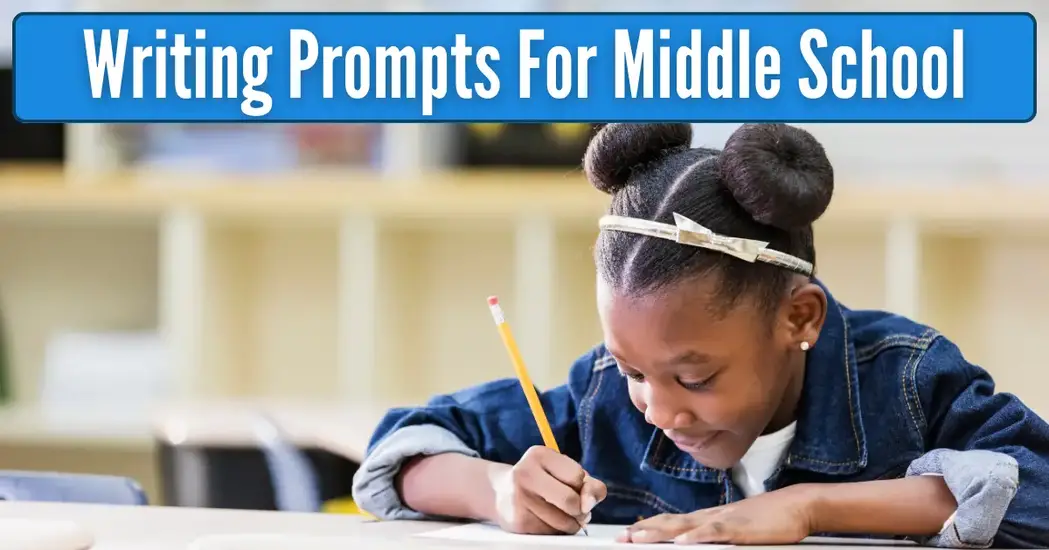
120 Engaging Middle School Writing Prompts
Getting middle school students to write can be particularly challenging. However, if you provide your students with a fun, interesting, and engaging writing prompt, you’ll find that their creativity and enthusiasm for writing can be easily sparked.
Below is a list of writing prompts for middle school students, including creative prompts, journal prompts, persuasive writing prompts, expository writing prompts, and story starter prompts. These are perfect for classroom exercises, homework assignments, or even just for personal exploration, helping students to develop their writing skills, express their ideas, and discover the joy of writing.
Creative Writing Prompts for Middle School Students
These creative writing prompts are cues or scenarios that inspire imaginative storytelling and personal expression. These prompts will encourage middle school students to explore new ideas, develop their narrative skills, and express themselves in unique and creative ways. Here’s a list of creative writing prompts for middle school students:
Journal Writing Prompts for Middle School Students
These journal writing prompts are thought-provoking questions or ideas that will encourage middle school students to reflect on their personal experiences, feelings, and beliefs. These prompts are designed to help students develop self-awareness, enhance their writing skills, and express themselves in a safe, private space. Here’s a list of journal writing prompts for middle school students:
Persuasive Writing Prompts for Middle School Students
These persuasive writing prompts are designed to inspire middle school students to develop arguments and persuade readers about a particular viewpoint or idea. These prompts will encourage critical thinking and research skills and enable students to present and justify their opinions clearly. Here’s a list of persuasive writing prompts for middle school students:
Expository Writing Prompts for Middle School Students
Narrative writing prompts for middle school students.
These narrative writing prompts encourage middle school students to tell a story, either about themselves, someone else, or a completely fictional scenario. This type of writing helps students develop their storytelling skills, enhances their creativity, and allows them to express their thoughts and experiences in an engaging way. Here’s a list of narrative writing prompts for middle school students:
Story Starters for Middle School Students
You may also like.
55 Creative Writing Activities and Exercises

Have you ever heard these questions or statements from your students?
- I don’t know where to begin.
- How can I make my story interesting?
- I’m just not creative.
- What should my story be about?
If so, you won’t want to miss these creative writing activities.
What Are Creative Writing Activities?
Activities that teach creative writing serve as drills to exercise your student’s writing muscle. When used effectively, they help reluctant writers get past that intimidating blank paper and encourage the words to flow.
When I think of creative writing exercises , writing prompts immediately come to mind. And, yes, writing from a prompt is certainly an example of a creative writing activity (a highly effective one).
However, writing prompts are only one way to teach creative writing. Other types of activities include games, collaboration with others, sensory activities, and comic strip creation to name a few.
Unlike writing assignments, creative writing activities aren’t necessarily meant to create a perfectly polished finished project.
Instead, they serve as more of a warmup and imagination boost.
Picture-based writing exercises are especially fun. You can download one for free below!

get this picture prompt printable for free!
How to use creative writing exercises effectively.
When teaching creative writing , the most effective exercises inspire and engage the student.
Remember that worn-out prompt your teacher probably hauled out every year?
“What I Did This Summer…”
Cue the groaning.
Instead of presenting your student with lackluster topics like that one, let’s talk about ways to engage and excite them.
For Kids or Beginners
Early writers tend to possess misconceptions about writing. Many picture sitting down for hours straight, polishing a story from beginning to end.
Even for experienced writers, this is next-to-impossible to do. It’s preconceived ideas like these that overwhelm and discourage students before they’ve even started.
Instead of assigning an essay to complete, start with simple, short writing exercises for elementary students such as:
- Creating comic strips using a template
- Talking out loud about a recent dream
- Writing a poem using rhyming words you provide
- Creating an acrostic from a special word
Creative writing exercises don’t have to end in a finished piece of work. If the exercise encouraged creative thinking and helped the student put pen to paper, it’s done its job.
For Middle School
Creative writing activities for middle school can be a little more inventive. They now have the fundamental reading and writing skills to wield their words properly.
Here are some ideas for middle school writing exercises you can try at home:
- Creating Mad Lib-style stories by changing out nouns, verbs, and adjectives in their favorite tales
- Storyboarding a short film
- Writing a family newsletter
- Creating crossword puzzles
For High School
Your high school student may be starting to prepare for college essays and other important creative writing assignments.
It’s more critical than ever for her to exercise her writing skills on a regular basis.
One great way to keep your high schooler’s mind thinking creatively is to have her make “listicles” of tips or facts about something she’s interested in already.
Another fun and effective creative writing exercise for high school is to have your student retell classic stories with a twist.
List of 55 Creative Writing Activities for Students of All Ages
No matter what age range your students may be, I think you’ll find something that suits their personality and interests in this list of creative writing ideas. Enjoy!
- Using only the sense of hearing, describe your surroundings.
- Write a paragraph from your shoes’ point of view. How do they view the world? What does a “day in the life of a shoe” look like?
- Imagine what the world will be like in 200 years. Describe it.
- Write a letter to someone you know who moved away. What has he or she missed? Should he or she move back? Why?
- Make up an imaginary friend. What does he or she look like? What does he or she like to do?
- Create a story about a person you know. Use as many details as possible.
- Write a poem that describes a place you have been.
- Soak up the season you’re in with seasonal creative writing prompts. Here are some ideas for fall and winter .
- Write a song where each line starts with the next letter in the alphabet.
- Create a list of words related to something you love.
- Write a short story based on a true event in your life.
- Rewrite a chapter of your favorite book from the antagonist’s point of view.
- Write a letter to your future self. What do you want to make sure you remember?
- Go on a five-senses scavenger hunt. Find three items for each sense. Create a story using the items you found.
- Create a story around an interesting picture ( try these fun picture writing prompts! )
- Find an ad in a magazine or elsewhere and rewrite the description to convince people NOT to buy the advertised item.
- Write a story using the last word of each sentence as the first word of the next.
- Describe everything you’re sensing right now, using all five senses.
- Write a list of animals A to Z with a one-sentence description of each one. Feel free to include imaginary animals.
- Design your dream room in detail.
- Write a script of yourself interviewing a famous person. Include his or her answers.
- Describe what high school would be like if you lived on the moon. What would you be learning about? How would you be learning it?
- Describe a day in the life of a famous person in history. Include both mundane and exciting details of things they may have experienced on a normal day.
- Pick up something on a bookshelf or end table nearby. Now write a commercial script for it to convince your audience that they absolutely must own this thing.
- Plan a birthday party for your best friend. Describe the decorations, food, and everything else.
- Write a very short story about three siblings fighting over a toy. Now rewrite it twice, each time from a different character’s perspective.
- Tell a story from the point of view of a pigeon on a city street.
- Create a menu for a deli you’ll be opening soon. Name each sandwich after something or someone in real life and list the fillings and type of bread.
- Pretend you just became famous for something. Write 3 exciting newspaper headlines about the topic or reason behind your newfound fame.
- Keep a one-line-a-day journal. Every day, write down one thought or sentence about something that happened that day or how you felt about the day.
- Have you ever had a nightmare? Write what happened but with a new ending where everything turns out okay (perhaps the monster was your dad in a costume, preparing to surprise you at your birthday party).
- Write a “tweet” about something that happened to you recently, using only 140 characters.
- Take an important event in your life or the life of someone in your family. Write one sentence answering each of the 6 journalistic questions: Who, What, When, Where, Why, and How.
- Set a timer for 5 minutes and write nonstop, starting with the words “I remember.” If you get stuck, write “I remember” again until you get unstuck.
- Pick something you use often (a toothbrush, your desk, etc). Then tell the story of how it was invented. If you don’t know, make something up.
- Choose a princess or hero and write a one-paragraph story about him or her traveling to a distant land.
- Pretend you are a tour guide for a local attraction. It can be a library, a park, or a museum, but it could also be a place that wouldn’t normally hold tours (such as an arcade). Write a speech about what you tell your tour group as you walk around the attraction.
- Create a marketing brochure for your favorite activity or fun place to go.
- Make a list of 10 future story settings. Write one sentence describing each. For example, “ in the dark, musty cellar of my grandmother’s house, surrounded by dried-up jars of canned peaches… ”
- Make a list of foods included in a dinner party catered by the world’s worst cook, describing how each course looks, smells, and tastes. Include your reactions while eating it.
- Write out your own version of instructions for playing your favorite game.
- Pretend you’ve lost your sight for one night. Describe going out to eat at a restaurant, using smells, textures, and sounds to tell your story.
- Write a script for an interesting phone conversation in which the reader can only hear one side.
- Tell the story of an object someone threw away from the perspective of the person who tossed it out. Then tell the story of that same object from the perspective of a person who finds it and deems it a treasure.
- List your 3 least favorite chores. Pick one and write a one paragraph detailing why you can’t possibly complete that chore ever again.
- Write an excerpt from your dog’s diary (pretend he keeps one).
- Write the script for a movie trailer—real or imagined.
- Create an acrostic for a holiday of your choice.
- Pretend you’re the master of a role-playing game, describing a sticky situation in which the other players now find themselves. Describe the scenario in writing.
- Compose a funny or dramatic caption for a photo.
- Parents, place a textured object in a box without letting your student see it. Have him or her reach in, touch the object, and then describe how it feels.
- Write lyrics for a parody of a song.
- Make a list of 10-20 songs that would be played if a movie was made about your life.
- Describe the sounds, smells, sights, and textures you’d experience if you went to the beach for the day.
- Write an election speech with ludicrous and impossible campaign promises.
One of the best ways to encourage students to write regularly is by providing fun creative writing activities .
They serve to encourage both the habit and mindset of writing with imagination. If you need extra help with that, check out Creative Freewriting Adventure :
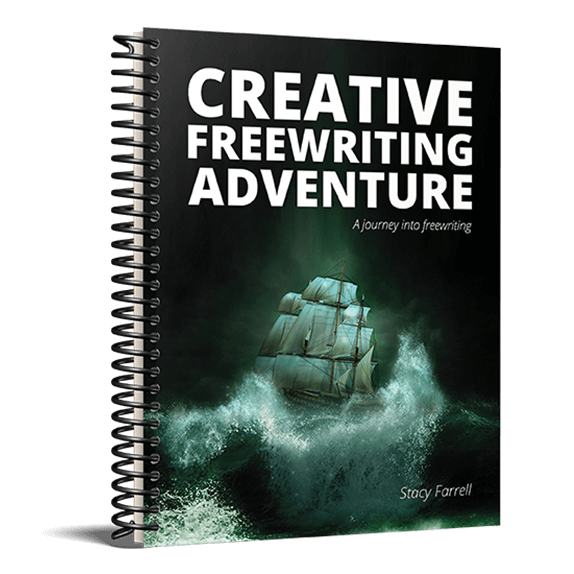
bring excitement into your student’s writing – no prep required!
About the author.
Jordan Mitchell
100 Creative Writing Prompts for Middle and Grade School Students
Creative writing is an important activity for middle and grade school students, as it nurtures imagination, enhances writing skills, and promotes self-expression.
Here are 100 creative writing prompts designed specifically for middle and grade school students to inspire their creativity and help them develop their writing talents.
You can also download these from the link just below and at the end of the article
How to Use Creative Writing Prompts
Tips for using prompts:, benefits of creative writing prompts:.
We also have Creative writing prompts for high school students here on the site as well.
Fantasy and Imagination
Real-life scenarios, animals and nature, adventure and exploration, relationships and emotions, school and learning, holidays and celebrations, science and technology, mystery and thriller, diverse cultures and perspectives.
Creative writing prompts are an excellent way to inspire middle and grade school students to explore their imagination and improve their writing skills.
Encourage your students to use these prompts regularly, share their stories, and continue honing their creative writing abilities.
Happy writing!
Share this:
Making english fun, similar posts, are quantifiers also determiners, free grade 5 reading and writing worksheets, free sight word worksheets ‘as’, teach your monster maths, consonant blends sentence generator, free printable grade 2 sight word worksheet – “off”, always welcome thoughts and comments, new blogs can be lonely cancel reply.
Check out our Premium Products in the shop today Dismiss
Discover more from Making English Fun
- Grades 6-12
- School Leaders
Have you seen our latest free teacher workshop?
10 Creative Writing Activities That Help Students Tell Their Stories
Lower the stakes and help them get started.

“I don’t have a story. There’s nothing interesting about my life!” Sound familiar? I don’t know a teacher who hasn’t heard students say this. When we ask our students to write about themselves, they get stuck. We know how important it is for them to tell their own stories. It’s how we explore our identities and keep our histories and cultures alive. It can even be dangerous when we don’t tell our stories (check out this Ted Talk given by novelist Chimamanda Ngozi Adichie and share it with your students for more on that). Storytelling is essential for every subject, not just English Language Arts; students dive deeper and engage when they practice thinking about how their own stories intersect with historical events, civic engagement, and the real-world implications of STEM. These 10 creative writing activities can work in every subject you teach:
Here are 10 of our favorite story telling activities that inspire students:
1. write an “i am from” poem.
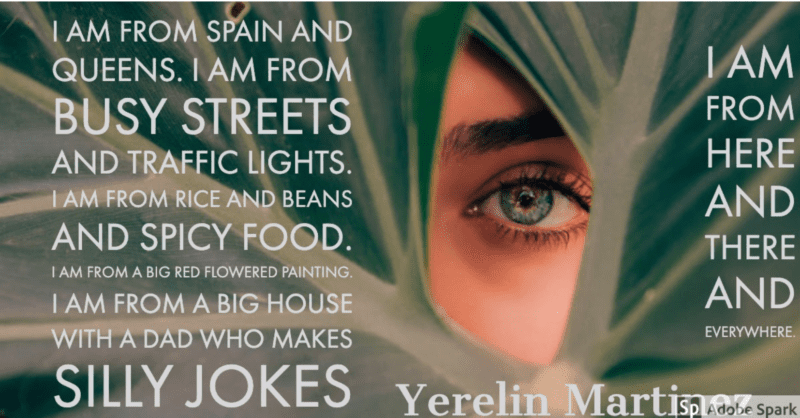
Students read the poem “I am From” by George Ella Lyon. Then, they draft a poem about their own identity in the same format Lyon used. Finally, students create a video to publish their poems. We love this one because the mentor text gives a clear structure and example that students can follow. But the end result is truly unique, just like their story.
2. Design a social media post to share an important memory
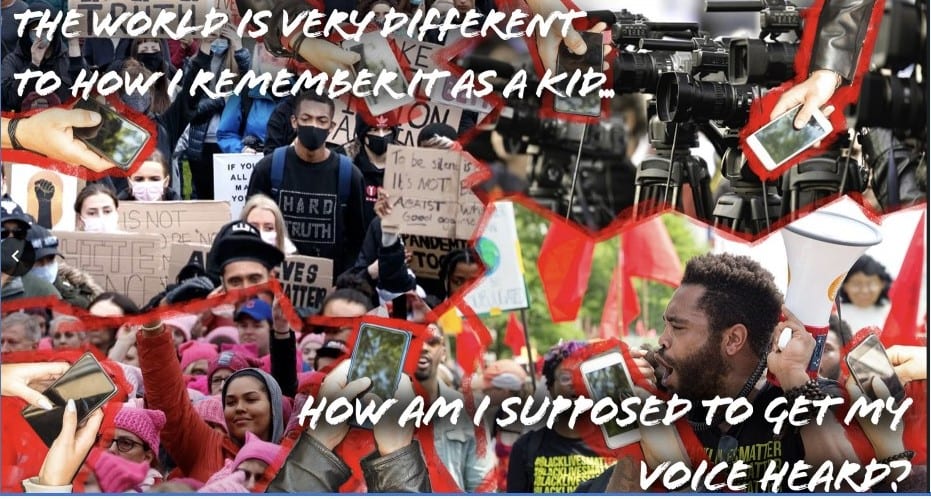
How can you use your unique perspective to tell a story? We want our students to learn that they are truly unique and have stories that only they can tell that other people want to hear or could relate to or learn from. In this activity, students watch two Pixar-in-a-Box videos on Khan Academy to learn about storytelling and perspective. Then, they identify an interesting or poignant memory and design a social media post.
3. Create an image using a line to chart an emotional journey
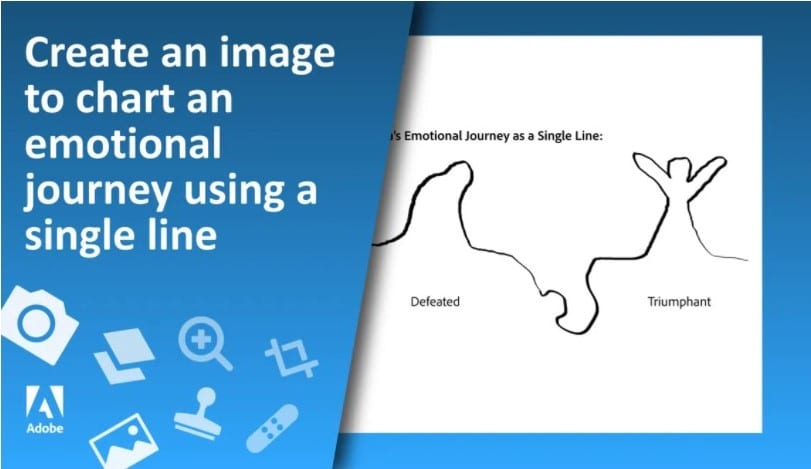
How do you show emotion using a single line? In this activity, students watch a Pixar in a Box video on Khan Academy to learn about how lines communicate character, emotion, and tension. Then they experiment with these aspects as they write their story. We love using this for pre-writing and to help students explore their story arc. Also, for students who love to draw or learn visually, this can help them get started telling their story and show them that there are many different ways to tell a story.
4. Tell the story behind your name

Sharing the story behind our name is a way to tell a story about ourselves, our culture, and our family history. And if there isn’t a story behind it, we can talk about how we feel about it and describe what it sounds like. In this activity, students use video to introduce themselves to their classmates by discussing the origin of their name. This project asks students to connect their names (and identities) to their personal and familial histories and to larger historical forces. If you’re looking for a mentor text that pairs well with this one, try “My Name” by Sandra Cisneros .
5. Develop a visual character sketch
Give students the time to create a character sketch of themselves. This will help them see how they fit into their story. In this lesson, students create a visual character sketch. They’ll treat themselves like a character and learn to see themselves objectively.
6. Create a webpage to outline the story of your movie
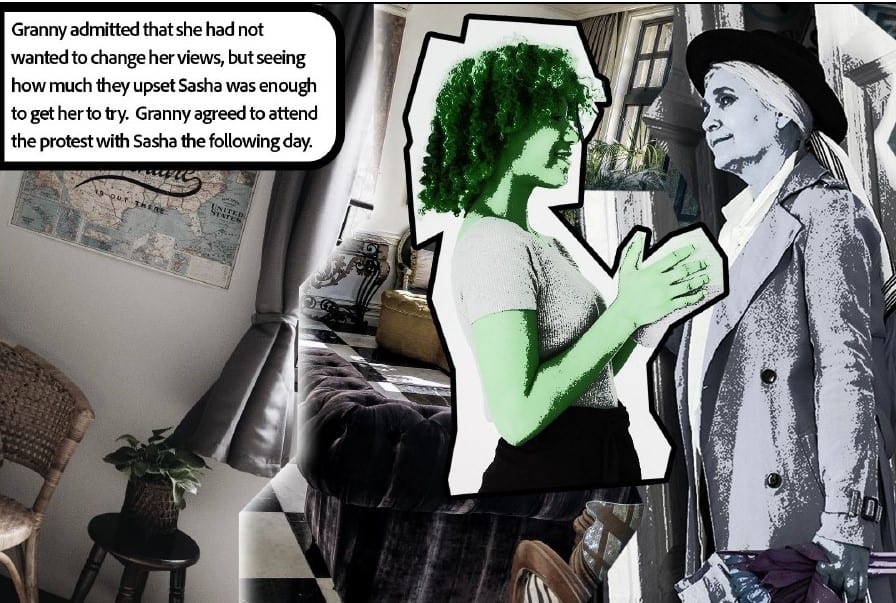
Building a story spine is a great way to show students how to put the parts of their story in an order that makes sense. It’s an exercise in making choices about structure. We like this activity because it gives students a chance to see different examples of structure in storytelling. Then, they consider the question: how can you use structure to set your story up for success? Finally, they design and illustrate an outline for their story.
7. Respond to a variety of writing prompts
Sometimes our students get stuck because they aren’t inspired or need a different entry point into telling their story. Give them a lot of writing prompts that they can choose from. Pass out paper and pencils. Set a timer for fifteen minutes. Then, write 3-4 writing prompts on the board. Encourage students to free-write and not worry about whether their ideas are good or right. Some of our favorite prompts to encourage students to tell their story are:
- I don’t know why I remember…
- What’s your favorite place and why?
- What objects tell the story of your life?
- What might surprise someone to learn about you?
8. Create a self-portrait exploring identity and self-expression
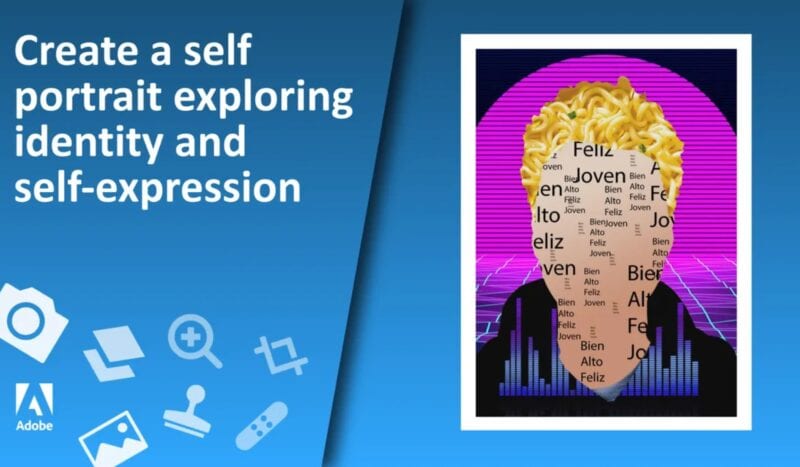
Part of what makes writing your own story so difficult for students is that they are just building their identity. In this activity, students explore how they and others define their identity. What role does identity play in determining how they are perceived and treated by others? What remains hidden and what is shown publicly?
9. Film a video to share an important story from your life

Encourage students to think about how to tell the story of a day they faced their fears. Students consider the question: How can you use different shot types to tell your story? They watch a video from Pixar in a Box on Khan Academy to learn about different camera shots and their use in storytelling. Then, they use Adobe Spark Post or Photoshop and choose three moments from their story to make into shots. We love using this to help students think about pace and perspective. Sometimes what we leave out of our story is just as important as what we include.
10. Try wild writing
Laurie Powers created a process where you read a poem and then select two lines from it. Students start their own writing with one of those lines. Anytime that they get stuck, they repeat their jump-off line again. This is a standalone activity or a daily writing warm-up, and it works with any poem. We love how it lowers the stakes. Can’t think of anything to write? Repeat the jump-off line and start again. Here are some of our favorite jump-off lines:
- The truth is…
- Some people say…
- Here’s what I forgot to tell you…
- Some questions have no answers…
- Here’s what I’m afraid to write about…
You Might Also Like
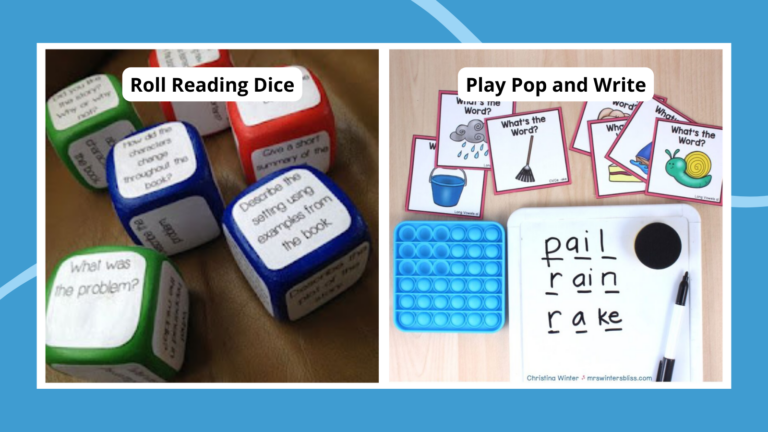
23 Fun and Easy Guided Reading Activity Ideas
Boost reading skills in small groups. Continue Reading
Copyright © 2024. All rights reserved. 5335 Gate Parkway, Jacksonville, FL 32256
6 Fun Writing Activities For Middle School Kids
We’ve rounded up writing activities aimed at middle-school age kids to get them to practice writing and to channel their creativity. Try out a writing activity yourself too!
1. Practice your argumentative writing .
In an argumentative essay, the writer takes a stance on a debatable topic. This stance, and the claims to back it up, is the argument . An argumentative thesis statement allows the writer to take a position about a subject (e.g., the deeper meaning of a literary text, the best policy towards a social problem) and to convince readers of their stance. The body of the argumentative essay uses examples and other evidence to support the writer’s opinion.
For example: Shakespeares’s Taming of the Shrew uses humor, disguise, and social roles to criticize the lack of power women had in Elizabethan England.
Activity 1: Write an argumentative paragraph using these seven argumentative words:
- in conclusion
- for example
Already an expert at argumentative writing? You’ll find 10 alternatives to in conclusion here.
Activity 2: Write your own scary campfire story.

Then share it with other students or family. (Bonus: turn off the lights and use a flashlight while you read it!)
To learn how to write a great scary story, read this article !
2. Write about careers.
First, watch a video on unique careers you may have never heard of. Then watch another video specifically about people who write the definitions in a dictionary: lexicographers .
- Video 1: Did You Know The Names Of These Unique Careers? [Dictionary.com YouTube]
- Video 2: Did You Know Real People Write The Dictionary? [Dictionary.com YouTube]
Try one of these three activities:
- Write a paragraph about which unique career from the videos above you might like to do when you’re older. Why
- Practice creating your own resume using our template from this article: How Do I Write A Résumé?
- Watch a movie and write down all of the careers the characters in the movie have. Look up the careers in the dictionary if you’re unfamiliar with any of the career terms.
3. Practice taking notes.
Take notes while watching a video.
WATCH: Types Of Hooks
Activity 1: While watching the “Types of Hooks” video, use these guided notes [PDF] to take notes about it. If you don’t have a printer, copy down some of the prompts from the guided notes onto a piece of paper or computer document.
Activity 2: Take notes about the information in this video (using some of the guided notes prompts from above).
- Video: Where Did The Days Of The Week Get Their Names? [Dictionary.com YouTube]
Activity 3: Ask another student or family member about their favorite “ hooks ” in songs. Although a hook in a song may not come at the beginning, this is still what “hooks” the listener in and makes them want more. Listen to a couple of songs together, and see if you all can identify the hook together.

4. Find the main idea.
Find the main idea (or the author’s purpose) in some informational texts. Read these informational texts [PDF] and answer the close reading questions.
Then, complete the graphic organizers (in the link with the informational texts) on the main idea, author’s purpose, and compare/contrast that follow.
Activity 1: Read this article: “Introvert” vs. “Extrovert” . Answer the following close reading questions.
- What is the origin of the word introvert ?
- What does the word extrovert mean?
- Are these two words similar in meaning?
- What do these words typically describe?
- Are you an introvert or an extrovert ?
Activity 2: Watch a fun movie.
After the movie, discuss what you think the main idea and the author’s purpose of the movie was.
Activity 3: Think about your friends or family members and classify them as introverts or extroverts .
Then tell them what you think they are and see if they agree.
5. Practice nonfiction writing.
Activity 1: Respond to one of these prompts:
- The governments of the world have agreed to ban all vehicles and factories that produce air pollution. What is this new world like?
- Imagine you are an aluminum can. Describe your journey from the store to a home to a recycling center from the can’s point of view.
- Write an explanation of the water cycle for a 7-year-old child. Be sure to use simple vocabulary.
For more ideas, check out this page of writing prompts !
Activity 2: Read a nonfiction article or book about an environmental crusader, such as Rachel Carson, Al Gore, or Greta Thunberg .
Look up the meaning of any unfamiliar words on Dictionary.com , then write a report about what you learned.

6. Practice spelling.
Activity 1 : Have you ever wondered why words in English have so many different spelling rules?
- Read this article to find out why .
- Read this article to learn the most commonly misspelled words—and spelling tips for each one .
Consider these discussion or writing prompts:
- Is there a spelling rule that you just don’t agree with? Why?
- Have you or any friends ever sent an auto-correct error in a text?

Activity 2: Look over this article on how spell checking works in our technology .
Go through your text messages together with other students. Find out who has the most misspellings. Was it auto-correct or just a human error?
Watch these videos about typos and share funny stories about auto-correct.
- Video 1: We All Make Typos: What’s Your Worst One? [Dictionary.com YouTube]
- Video 2: What’s The Best Typo You’ve Ever Made? [Dictionary.com YouTube]

Ways To Say
Synonym of the day
- Skip to primary navigation
- Skip to main content
- Skip to primary sidebar
Teaching Expertise
- Classroom Ideas
- Teacher’s Life
- Deals & Shopping
- Privacy Policy
51 Creative Writing Activities For The Classroom: Comics, Prompts, Games, And Pretend Play
January 4, 2024 // by Milka Kariuki
Creative writing can be tough for learners of any age. From knowing where to start to establishing the vocabulary to develop their story, there are a bunch of different skills they’ll need to perfect their creative writing pieces. There are so many creative writing activities out there, but which ones are best for your kiddos? Our list of 51 creative writing activities is the perfect place to start looking if you’ve got a creative writing unit coming up! Read on and see which ones might grab your little writers’ attention!
1. Make Your Own Comic Books
We bet your kiddos just love comic books! Let them create their very own in the style of the super popular Diary of a Wimpy Kid books! Encourage your students to come up with their own plot, dialogue, and illustrations to spark their creativity. Even your most reluctant writers will love this fun activity!
Learn More: Puffin Schools
2. Mad Libs
Using Mad Libs is a super popular way to develop your little creative writers! Use these free printables to get their creative juices flowing as they try to come up with words to fill the gaps to create weird and wonderful new stories. The best thing is that you can use these printables as many times as you like as their answers will be different each time!
Learn More: Teacher Vision
3. Flash Fiction
Flash fiction is a fantastic way to get your kiddies writing creatively while keeping things short and sweet! Use the range you prompts included in this resource to challenge them to write a creative story in less than 100 words. Flash fiction is amazing because your students won’t be overwhelmed by a huge writing task and it also means that your more confident writers will need to focus on the quality of their work, not the quantity!
Learn More: TES
4. Write a Story Based on the Ending
Test your students’ creativity by providing them with writing prompts that start at the end! In backward story writing, your budding writers will need to plan and pen a story that eventually leads to the ending you give them. This idea is a fantastic way to turn your traditional creative writing lesson on its head and in many ways take the pressure off your kids, as ending their stories is often the most difficult part for them!
Learn More: Teachers Pay Teachers
5. Found Poetry
Your learners will love this fun and creative found poetry activity. You can encourage them to collect words or a group of words from a favorite story or song then write them on a piece of paper or cut them out of a printed page. The overall goal is to have them rearrange the words differently to make an interesting poem with a unique writing style or genre!
Learn More: Homeschooling Ideas
6. Picture Dictionary
A picture dictionary is a brilliant way to support every member of your younger elementary class in their creative writing. The words paired with pictures give your writers a ‘dictionary’ that they can use pretty independently, so your less confident writers or non-native English-speaking students can still access your writing lessons!
Learn More: Twinkl
7. Creative Journal Writing
Why not start a creative journal with your kiddos? Have them engage in daily journaling activities by giving them a different creative prompt each day. For instance, write a story about what would happen if dogs took over the world or what would you do if you were the security guard at a zoo and someone stole an animal? The fun is never-ending with these prompts!
Learn More: Think Written
8. Roll a Story
Roll-a-Story is one of the best ways to help any of your kids who are suffering from a bout of writer’s block! They’ll roll the dice to discover the character, setting, and problem for their story then set to work weaving their creative tale! It could be a story about a wise doctor being chased by a mysterious creature in a casino, or maybe a rich artist losing their wallet in a library. Then it’s up to your students to fill in the gaps!
Learn More: TPT
9. Pass-it-on Story Writing
There’s no telling quite where this fun writing game will end up! Start by writing the first sentence of a story on a piece of paper then pass it around your class, having your kids come up with a sentence that continues the story. The paper is then passed around the whole class until every student has contributed. Finally, once it makes its way back to you, read out your collaborative story to the whole class!
Learn More: Minds In Bloom
10. Picture Writing Prompts
Creative writing prompts activities test not only your little ones’ imaginations but also their ability to craft a story and dialogue from that. Display an intriguing picture prompt for your class and have a discussion about it, recording their ideas. You could discuss what the person or animal in the picture is doing or what they’re thinking, where they think the picture was taken, and much more. They can use your collective notes to inspire their story!
Learn More: Pandora Post
11. What’s the Question?
What’s the Question is a simple, yet super engaging game that requires your young learners to think creatively. Spark their creativity by writing an answer on the whiteboard such as “the moon would explode,” and task your kiddos with coming up with a question to match it. There’ll be lots of laughs as everyone shares what they came up with!
Learn More: That Afterschool Life
12. Creative Writing Printables
This website is absolutely full of quick and fun graphics for children that’ll encourage their creative writing! The cute graphics and simple directions make it an easy bellringer activity for your writing class. Just print out some of these cool sheets and let your students get creative as they write thank-you notes to helpful heroes or finish little cartoon comics!
Learn More: Jarrett Lerner
13. Paint Chip Poetry
Nothing says creative writing quite like figurative language! Grab some of these free paint swatches from your local home improvement store and have your students create metaphors about their chosen color! We love this low-prep activity as once your kids have finished their poems, they’re a ready-made multi-colored display that’ll brighten the walls of your classroom!
Learn More: Fabulous In Fifth
14. Story Storm Activities
Once again, these Jarrett Lerner activities do not disappoint! Your students will have a blast pretending they are the principal for a day and they’ll get to create their very own rules for the school. Not only will this be an engaging writing exercise that we’re sure they’ll love getting creative with, but it also challenges children to think about why rules in school are important.
Learn More: Tara Lazar
15. Story Bag
Story bags are a fantastic way to destroy any kind of writer’s block! Grab an assortment of random objects from your home or classroom and pop them into the story bag. Next, gather your students around and pull out all the objects in the bag. Can they then write a story connecting all the items? Be sure to leave time to let them share their stories at the end of the lesson!
Learn More: Life Hack
16. Change the Ending
An easy way to ease your kiddos into the writing process is by having them rewrite part of a story. Grab their favorite read-aloud, and challenge them to come up with a new ending! They’ll need to finish the story in a way that makes sense, but aside from that, they can be as creative as they like! Your reluctant readers will like this one as much of the work on setting and characters has already been done!
Learn More: Make Beliefs Comix
17. Plot Twist Writing Prompts
BUT WAIT – there’s a twist…This fun writing practice is perfect for older middle or high school but could also be simplified for younger students. Write these twist prompts on notecards and have your kids draw one each before letting them go off and write a story around their chosen twist! They’ll be eager to share their finished work with classmates at the end. After all, who doesn’t love a good plot twist?
Learn More: Pinterest
18. Craft Box Craft
Every kid loves the book The Day the Crayons Quit for its creative narrative about this familiar box of coloring supplies! This extension activity rolls art and creative writing into one! Your students will have fun coming up with dialogue for each of the different crayons and you could even make it into a fun display for your classroom walls!
Learn More: Buggy And Buddy
19. Dialogue Pictures
Personalizing writing activities always makes it more engaging for kids! Print out a picture of yourself with a blank speech bubble, and model how to add in some dialogue. Then, let your kiddos practice speech bubbling with a photo of themselves, a pet, or a favorite celebrity, and have them come up with some interesting things for each of their subjects to say!
Learn More: SSS Teaching
20. Figurative Language Tasting
Your students will be creative writers in no time after practicing their figurative language with food tasting! Not only do tasty treats make this activity incredibly fun, but it also brings the writing process of metaphors and hyperbole to life. Just give each of your kids a few pieces of candy or snacks, and have them practice writing figures of speech relating to each one! They’ll have the words on the tip of their tongue- literally!
Learn More: It’s Lit Teaching
21. Explode the Moment
One of my favorite writing concepts as a teacher is ‘exploding the moment’. This method is perfect for showing your kiddies that even the smallest moment can be turned into an imaginative, descriptive story! Start by having them brainstorm some ideas and expand on tiny memories like losing a tooth, getting a pet, or making a winning goal in a soccer game!
Learn More: Raise The Bar Reading
22. Round-Robin Storytelling
Round-robin storytelling is the perfect collaborative creative writing activity! This one can be done verbally or in writing, and it challenges your class to build a story using a given set of words. They’ll have a fun and challenging time figuring out how to incorporate each piece into one cohesive story.
Learn More: Random Acts Of Kindness
23. Acrostic Poems
Acrostic poetry is one of the least intimidating creative writing exercises as there are no rules other than starting each line with the letter from a word. Challenge your kiddies to use each letter in their name to write lines of poetry about themselves, or they could choose to write about their favorite food or animal!
Learn More: Surfin’ Through Second
24. Sentence Sticks
This exercise requires minimal prep and can be used in so many different ways. All you’ll need are some craft sticks in which you will write sentences with blanks and word banks. Your young writers can then pull a stick and fill in the blanks to practice creative thinking! Task them with a different goal each time; can they make the sentence silly or sad for example?
Learn More: Liz’s Early Learning Spot
25. Conversation Prompts
These fun prompts require your kids to think creatively and answer a range of interesting questions. They’ll be excited to write stories about waking up with a mermaid tail or describe what is in a mystery package delivered to their doorstep! These creative prompts are perfect for bellringers or transitions throughout the school day!
Learn More: Twitter
26. Pretend Play Writing
Do you remember playing with fake money and fake food when you were younger? This idea takes it a step further by incorporating some writing practice! All you’ll have to do is print the templates for dollars, shopping lists, and recipes then let your little learners have fun with these play-pretend writing ideas!
Learn More: Prekinders
27. Question Cubes
Your class will be on a roll with these amazing question cubes! Whether the cubes are used for responding to a story, brainstorming the plot of a story, or practicing speech and listening, they are an easy, affordable tool for your little readers and writers! You can snag some foam dice at the dollar store and hot glue questions on each side to spark some creative writing ideas for your class.
Learn More: A Love 4 Teaching
28. Balderdash
Not only is Balderdash an addicting board game, but it can even be used in the classroom! Your little learners will have a blast as they create made-up, imaginative definitions for words, important people, and dates. Whoever guesses the real answer out of the mix wins the points!
Learn More: EB Academics
29. Two Sentence Horror Story
This creative writing exercise is best for older students and would be a great one to try out around Halloween! You’ll be challenging your learners to write a story that runs chills up their readers’ spines, but there’s a twist…the story can only be two sentences long! Your kiddos will love writing and sharing their writing to see who can come up with the spookiest short story!
30. Telephone Pictionary
Another game that your kids will be begging to play over and over again is telephone pictionary! The first player will write down a random phrase, and the next person must draw their interpretation of the phrase. The third player will write what they think the picture is and so on!
Learn More: Imagine Forest
31. Consequences
You need at least two players for this fun creative writing game. Each pair or group of kids will start by having one person write a random phrase and conceal it by folding the paper. Then, they pass it to the next student to fill in the blank using the prompt. Once all the blanks are filled in, let them unfold the paper and get ready to reveal some seriously silly stories!

32. Story Wands
Story wands are a fun way to have your kids respond to stories and study what makes something their favorite. Responding to what they’re reading is a super helpful exercise in preparing them for creative writing as it allows your students to connect to their favorite stories. By figuring out what elements make stories great, this is sure to help them in their own creative writing assignments!
Learn More: Little Lifelong Learners
33. The Best Part of Me
Probably my favorite creative writing activity, this one is infused with social-emotional learning and self-esteem building! Let your students get to choose their favorite physical characteristics about themselves; whether it be their eyes, hands, feet, etc. Then, they take a picture to attach to their written reasoning! Make sure to boost the creative element of this writing task by encouraging your learners to use a bunch of adjectives and some figurative language!
Learn More: Sarah Gardner Teaching
34. Me From A-Z
Challenge your kiddos to get creative by coming up with 26 different words to describe themselves! Me From A-Z gives your students the opportunity to explore who they are by coming up with words describing them in some way using each letter of the alphabet. Why not let them decorate their lists and turn them into a display celebrating the uniqueness of each of your class members?
35. How to Make Hot Chocolate
How-to writing is a great way to get the creative writing wheels turning in your kiddies’ brains! They’ll have a fun time coming up with their instructions and ways to explain how to make hot chocolate! Do they have a secret recipe that’ll make the best-ever hot cocoa!? Once they’ve written their instructions, be sure to try them out and do a taste-test of their recipes!
Learn More: Teacher Mama
36. Give Yourself a Hand
Hands up if you love this idea! For this creative writing activity, have your little ones trace their hand on a piece of paper and decorate it with accessories. Then, encourage them to write a list of all the different things they do with their hands all over their tracing! This is a great warm-up to get the creative gears turning.
Learn More: Write Now Troup
37. Word Picture Poem
A word picture poem is a fantastic way to challenge your kids to write descriptive poetry about a common object! Your little poets will learn to find beauty in ordinary things and strengthen their sensory language skills and their vocabulary. For some added fun, you can even task them with writing a short story about the item as well! The results are sure to be fun to read!
Learn More: Teaching With Terhune
38. Shape Poem
Shape poems are some of the most creative poetry as they combine words and art into one! First, your young poets can choose an object to use as their muse and lightly trace an outline onto some paper. Then, they’ll write words along the outlined shape in the form of a poem that describes the object! The result is a bunch of fun and striking poems that’ll look great displayed around your classroom!
39. Crazy Hair Poetry
Here’s another one that combines writing and art! Start by guiding your kiddos in drawing a self-portrait then adding some crazy hair by blowing watercolor paints around! After the paint dries, have your kids come up with a short but creative poem describing their hair art.
Learn More: Grade School Giggles
40. Fingerprint Poetry
Nothing is more creative than getting your kiddies to let down the barriers in their mind and tap into their stream of consciousness! Show them how to pick a topic and then let their words flow straight from mind to paper in a swirling pattern. This fingerprint idea can be used for a get-to-know-you activity as well!
Learn More: Kristen Dembroski
41. Doggie Haiku Poems
Put a fun twist on classic haiku poetry! Your students will have a paw-some time writing three-line poems about dogs which they can then illustrate afterwards! Before starting the activity, you can use Dogku by Andrew Clements as a read-aloud to get your class hooked on this idea!
Learn More: Teaching Fourth
42. Fractured Fairy Tale
Ever wondered if the Big Bad Wolf was framed? Or if Sleeping Beauty was actually a snorer? Your writers in training will have a fun time taking a classic fairytale and putting their own spin on it! Following five simple steps, your kids will be funky fairytale authors in no time!
43. Letter Writing
These creative letter-writing prompts are sure to boost your kiddies’ imaginative writing skills! Whether writing to a pen pal or a favorite celebrity, letter writing is a great way to practice handwriting, word flow, descriptive language, and communicating all rolled into one! Have your writers grab their pencils and let the creativity flow as they write fun response letters to these prompts!
44. Hersey’s Kisses Similes
Teach sensory language and similes by connecting this tasty treat with the sense of taste! Your students will have a lovely time brainstorming how chocolate connects to each of our senses and applying that knowledge by writing some sweet similies! What a fantastic way to teach them how to use these essential creative writing tools!
Learn More: Teacher By The Beach
45. Sensory Poetry
Another great way to teach sensory details is to have your learners write poems about their favorite foods! Task them with writing a line for each sense to describe the food! Everyone will be hungry after this creative writing lesson so it might be a good idea to have some snacks on hand!
Learn More: Mrs. Tice’s Class
46. Season Personification
Each season of weather has an array of characteristics making this the perfect activity to practice personification in creative writing! Allow your little writers to choose a season to write about as if it were a person with human characteristics. Winter is a no-brainer! It’s Elsa!
Learn More: Write Shop
47. Class Book of Character Traits
To be creative writers, your kids need to know how to create realistic characters for their stories. For this class book, you’ll start by giving each student two opposing character traits. Next, have them demonstrate these traits by illustrating two characters and displaying them through dialogue!
Learn More: Crafting Connections
48. Socialgrams
With Instagram being all the rage these days, your kiddos will have a fun time creating a ‘socialgram’ on paper! Challenge them to create a descriptive and engaging caption to go along with their “photo” in the post. Then, classmates can comment on each other’s work!
Learn More: Breezy Special Ed
49. Story Introduction Worksheets
Creative writing worksheets are a simple, minimal-prep tool to use in your creative writing units. Print out a variety of options, and have your kids practice their skills by finishing imaginative story introductions. By giving them a place to start their story, you can really take the pressure off your kids which will help ease them into the creative writing process!
Learn More: Lanternfish ESL
50. Dialogue Worksheets
Here’s another low-prep option for the last-minute planners! Pre-written dialogue can help guide the mood of the story and allow your kiddies to just focus on filling in the characters’ actions. This is also a great way to model how dialogue is spaced out and balanced in a story!
Learn More: ESL Writing Worksheets
51. Character Trait Posters
In this personalized character trait activity, your students will create a poster of themselves and label it with a bunch of different character traits. Descriptive, interesting characters are what make a story captivating, so this is a great introduction to understanding characters and their physical as well as personality traits! This is an activity that’s sure to help them build a strong foundation for their creative writing skills to build from!
Learn More: Life In First Grade
22 Writing Activities To Help Kids Hone Their Writing Skills
Written by Maria Kampen
- Prodigy English

- Fun writing activities
- Creative writing activities
- Academic writing activities
- At-home writing activities
- Daily writing activities
- Simple writing prompts for kids
- How writing activities can bring reluctant writers out of their shells
- Try some other educational activities
When kids start writing, they’re unlocking a whole new world of imagination to explore. It’s a great way for them to be creative, express themselves and practice key reading and writing skills.
But as most kids — and adults — will tell you, writing is hard! It can be intimidating to put pen to paper for the first time, and sometimes the challenge of a blank page seems like too much to overcome.
Writing shouldn’t be scary for kids. These 22 fun writing activities can help them:
- Use their imagination
- Think up new stories and ideas
- Share their writing with friends and family
Use them in your classroom or at home to get kids excited about writing!

Writing is supposed to be fun! Use these activities to help kids stretch their imagination and record their thoughts on paper in a fun, low-stress environment.
1. Try online ELA games like Prodigy English
Great for: Grades 1 to 6
Online games are a great way to engage students in the learning process — and Prodigy English is bringing the power of game-based learning to language and reading skill practice!
As students build and create, they’re always practicing key reading and language skills that help them write clearly and effectively. Every correct answer gives players more energy to gather resources, complete daily tasks and earn Wishcoins.
Plus, you can send questions about the topics you want them to practice and collect insights about their learning.
2. Poetry scavenger hunt
Great for: Middle and high school students
Words are all around us, so encourage your students to take inspiration from the real-life writing they see every day. Have students collect printed words and phrases from the world around them, including:
- Magazine ads
- Graphic novels
- Newspaper headlines
- Social media captions
Students can collect and arrange their words on a piece of paper to make a unique piece of poetry. Encourage them to find a key idea and expand on it in creative ways, then have students share their work with the class.
3. Create your own comic strip
Great for: Grades 4 to 10
Students learn in all sorts of ways. For visual learners, creating a comic strip to accompany their story can help them express themselves in a visual medium.
Give students a set number of panels and challenge them to come up with a quick story ��— just a few sentences. Then, they can illustrate their scene in the style of comic books.
Remind students the point isn’t to be the best artist — it’s to write a story that’s short and exciting.
4. Create your own Madlib
Great for: Elementary and middle school students
Give students vocabulary practice and help them write a silly story at the same time!
Fill a sheet with the outline of the story, then remove key words like:
For younger students, add a word bank to get them started. As students fill in words, they’ll craft a unique story filled with unexpected twists and turns.

Once students start getting in the habit of writing, these creative writing activities can pull new ideas out of their heads and encourage them to experiment with different genres.
5. Acrostics
Great for: Grades 3 to 8
Acrostic poems are a great way to introduce your students to poetry! Start with a meaningful word or name and use it as a theme for the poem.
Writing the word vertically, students can go down the letters and write a short word or phrase that starts with each letter. Acrostic poems help students write within a structure and theme, so it’s easier for them to get started.
6. A letter to your future self
Great for: Middle school and high school
Where do your students see themselves in a year? Five years? Ten years?
A letter to their future selves is a great way for students to explore their own story, and brainstorm what they want to achieve. Not only can students practice their letter-writing skills, they can use their imaginations to develop a growth mindset .
For extra nostalgia, store the letters for students and mail them out once the right amount of time has passed.
7. Write a “Choose your own adventure” story
Great for: Grades 5 and up
Whether it’s a fairy tale, detective story or drama, chances are you’ve had a student tell you they don’t know how their story is supposed to end.
A “Choose-your-own-adventure” story lets students brainstorm different storylines and endings. Once they’re done, encourage them to share their stories with the class so their peers can go on the adventure too.
8. Write a fake advertisement
Great for: Grades 6 and up
Good writing doesn’t just happen in books — it’s all around us!
Whether students are writing advertisements on their own or as part of a project-based learning assignment , this activity helps them build key media literacy skills and practice their snappy storytelling.
Have students make up a new product and advertisement, or encourage them to re-imagine an ad for something they love. It’s also a great way to bring media literacy and interdisciplinary learning to your classroom.
9. Make a story map
Great for: Grades 2 to 8
Not every student is going to be comfortable putting pen to paper right away. Story maps can help students brainstorm details like plot, characters and setting in a way that makes sense for visual learners.
Have students use charts to set out the beginning, middle and end of their stories. Mind maps can also help them plot out details about their characters or setting.
Encourage students to present their story map as a finished product or use it to start writing!
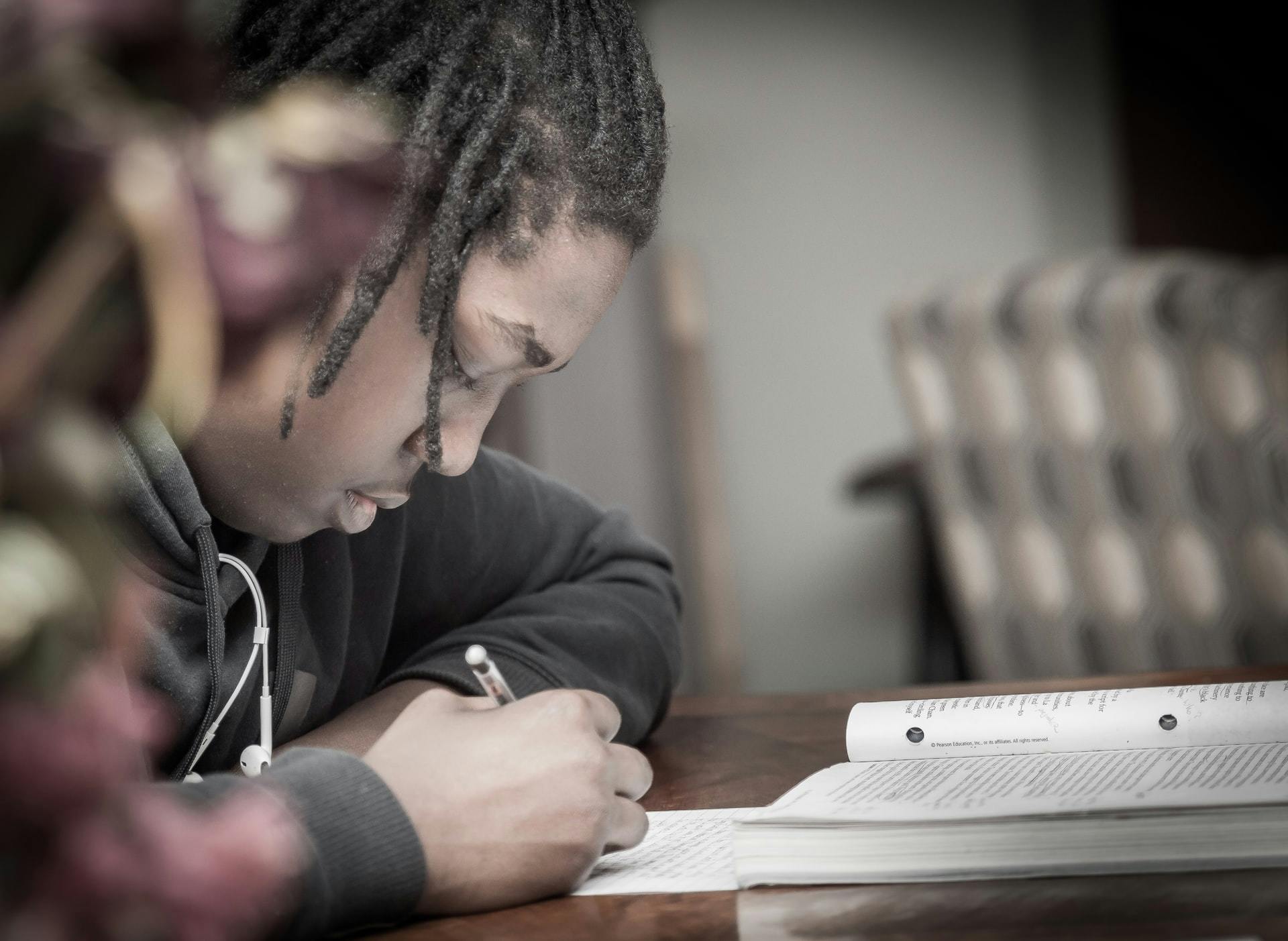
Writing isn’t all fairy tales and short stories — it’s also an important part of learning in middle school, high school and college. Use these academic writing activities to help students understand proper essay structure, grammar and more.
10. Story chains
Great for: Grades 4 to 8
Stories are better when they’re enjoyed with friends and classmates. And story chains encourage every student to get involved!
Put students in small groups of three to six. Give each student a blank piece of paper and have them write the beginning of a story. Then, pass it to the next student in the group so they can write what happens next.
For extra educational value, have students work together to summarize a story from your lesson or an important historical event.
11. Persuasive essays
Sometimes writing is about more than just telling a story. It’s about convincing your readers of your point of view.
Have older students practice their debate skills with persuasive essays. Start with a prompt, then let students make their case. Some of our favorite prompts for this writing assignment include:
- Is it more important to be right or to not hurt someone else’s feelings?
- What important historical figure do you think belongs on the ten-dollar bill and why?
- Do you think you’re born with your personality traits, or do you gain them as you grow up?
Most importantly, make sure students back up their opinions with solid facts and arguments that convince readers to care.
12. Solve a real-world problem
Great for: Grade 6 and up
Climate change, litter, bullying, bad cafeteria food — no matter what students pick, there are lots of real-world problems for them to solve.
Challenge students with a writing assignment that addresses a problem they see in their world. How would they fix it? Whether it’s a short paragraph or a longer essay, encourage them to find something they’re passionate about. After all, that’s where good writing comes from!
13. Vocabulary challenge
Great for: Elementary school students
Vocabulary challenges combine vocabulary strategies with student writing to make your next language arts lesson plan even more engaging.
Give students a new word (or two or three). Once you’re done practicing it and they know what it means, challenge them to use it in a story as creatively as possible.
14. Teach citations
Great for: Grades 1 to 12
Footnotes, endnotes and bibliographies are the least exciting part of writing, but they’re essential skills. As students write more complex research papers, they need to know how to give credit where credit is due. Thankfully, there are lots of online resources to help!
The Purdue Online Writing Lab offers teachers and students resources for all stages of the writing process, including citations. To practice, students can write an annotated bibliography as part of a project-based learning assignment or the first step in writing a longer research paper.

Writing isn’t just something happening in the classroom. These at-home writing ideas can help you support your child as they experiment with prose and poetry.
15. Write letters to a pen pal
Great for: Grades 3 and up
Everyone likes getting mail! Got a friend with kids in a different part of the country, or far-away family members? A pen pal can be a great way for kids to build friendships and practice their writing skills at the same time.
16. Bring a home object to life
“It’s as big as a mountain!”
“That’s the fluffiest thing I’ve ever felt!”
The ways kids describe things can crack us up sometimes. Full of wonder and hyperbole, it’s the perfect spark for creative writing, too.
Encourage kids to practice their figurative language skills with a description of something in your home. Let them pack as much alliteration and exaggeration into the description as they can, then do a dramatic reading out loud.
17. Write reading reactions
If you want to boost reading comprehension and writing skills at the same time, this is the perfect activity. After your child is done reading, encourage them to write a few sentences about what they just read.
Did they like it? What do they think happens next? Which character was their favorite and why? Learning how to express opinions in writing is a valuable skill.
18. Document family stories
Great for: Grades 4 and up
Every family has a unique story, including yours. Make memories with your child when you share stories about important family events or your childhood.
Kids can even interview grandparents, aunts and uncles to record their memories. When you’re done, store them in a shared space so everyone can go back and reminisce.

Writing is a muscle, and you have to flex it every day to get stronger. Use these daily writing activities to make writing part of your everyday routine.
19. Journaling
Great for: Everyone
Sometimes, you’ve just gotta write it out.
Whether you’re trying to make sense of life or just need a place to organize your thoughts, journaling is a great way to unwind, practice mindfulness and build social emotional skills .
All kids need to get started is a notebook and a pen. Let them know you’re not going to read it, but they’re welcome to come to you if there’s something they want to talk about.
20. Blog about your interests
Great for: High school and up
Everyone’s passionate about something. Whatever your students love, encourage them to share it with the world! Blogging is an accessible and fun way to express themselves, nerd out about the things that bring them joy and share their opinions with the world.
Sites like WordPress and Wix offer free website builders to help students get started. This is a great way for kids to build computer skills and digital literacy .
21. Free writing
Write, write, write and don’t stop. That’s the premise behind free writing, a writing practice that can help unlock creativity, discover new ideas and take the pressure out of a blank page.
Give students a five-minute timer and challenge them to write continuously, without worrying about formatting, spelling or grammar. They can write about whatever they want, but there’s only one rule: don’t stop.
22. Answer daily writing prompts
Make time to exercise your brain with daily writing prompts! At the start of the day or as a quick brain break , set aside time for students to respond to a quick daily writing prompt.
Students should have a dedicated journal or binder to make it a seamless part of your lessons. Whether or not you choose to read their writing is up to you, but it’s important to build good daily habits.

A blank page can be a scary sight for a student who doesn’t know what to write about.
Use writing prompts to:
- Kickstart a student’s imagination
- Start your lesson with a fun writing activity
- Give students a topic to debate in writing
Some of our favorite simple writing prompts include:
- Write a story about a wooden door, a can of soda and a blue shoe.
- If you met a monster looking for new friends, what would you do?
- What’s your favorite season? What makes it the best?
- If you could live anywhere in the world, where would it be and why?
- Describe your dream birthday cake.
- Write a story about being cold without using the word “cold.”
- If you could decorate your bedroom any way you wanted, what would it look like?
- Is it better to have lots of friends or just a few really good friends?
- Write a story in 10 words or less.
- Write a story about the best surprise you’ve ever received.
For more writing prompts you can use in and out of the classroom, check out our full list of 225 writing prompts for kids .
Writing activities can bring reluctant writers out of their shells
Writing is hard and can be intimidating for a lot of students.
But even the quietest and most reluctant students have lots of stories to tell! You just have to encourage them to get their words out.
Writing activities help remove some of the pressure and give students:
- A fun way to approach writing
- A starting point for their stories
- Chances to share their writing with students
No two stories are the same, just like your students. Every story can start in a different way, and that’s the beauty of writing prompts.
Whether it’s writing activities or math problems, there are lots of ways to get reluctant learners excited about your lessons with educational activities.
Here are some of our favorites:
- 37 Quick & Easy Brain Breaks for Kids
- 30 Virtual School Activities Students & Educators Love
- 27 Best Educational Games for Kids to Play Sorted by Subject
- 15 Geometry Activities to Engage Students Across Grade Levels
- 36 Fun Word Games for Kids To Help with Vocabulary & Literacy
- 15 Fun, Free & Effective Multiplication Games For Your Classroom
- 20 Exciting Math Games for Kids to Skyrocket New Math Skills On-The-Go
- 21 Classroom Games to Boost Teacher Effectiveness and Student Learning
- 25 Social Emotional Learning Activities & How They Promote Student Well-Being
Which ones can you use in your next lesson?
Prodigy English is a brand-new game-based learning platform helping students build key math skills. As students explore and build a world of their very own, they’ll answer curriculum-aligned reading and language questions that help build essential skills and encourage a love of learning.
Sign up for your free teacher account and get access to teacher tools that help you differentiate learning and track student progress as they play.
Share this article
Table of Contents
Prodigy English is here! Get your students playing — and learning — today.

10 Writing Warm-Ups to Engage Your Students in the Middle School ELA or High School English Classroom
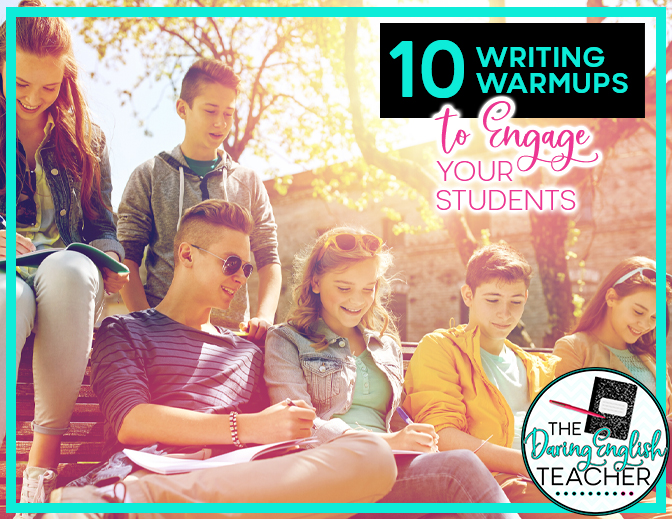
In the public education setting, timed-writes are a required part of many standardized tests. Rather than try to cloak that reality, embrace it! One great way to do this is with fun and engaging writing warm-ups! Show your students that timed writing can be a fun challenge, and develop their expository and analytical prowess by beginning every class with a writing warm-up. These warm-ups should take only five to ten minutes, and you can easily implement them into your daily bell-ringer routine.
Here are 10 writing warm-ups to build your students’ writing confidence:
1 minute story.
Get your students in the habit of writing from the word “go.” Set the time for 60 seconds and task them with writing a complete short story with a beginning, middle, and end in that time. The first time, many of them will probably find themselves caught up in the pressure or struggle over what to write. That’s okay! The more they practice, the better they will become at thinking quickly and excluding any unnecessary information. By the end of the school year, an essay in forty-five minutes will seem like a piece of cake! It’s best not to score these short stories. Instead, work on progress. If a student has trouble with this, encourage them to keep adding to their story with the one-minute you give them in class.
A Picture is Worth A Thousand Words
Put an image up on the board, and have your students write a short paragraph about it. You can have them pen a short story, a long-form poem, or an explanation of what a student perceives the situation depicted to be. This exercise will encourage creative and critical thinking skills, both of which are essential in rhetorical analysis.
Note: the image should have as much or as little visual information as is appropriate for the type of response you are seeking. For example, for a poem, a picture of an apple would suffice; whereas, a stock photo of a couple might better suit a short story or analysis.
Teaching Resource: Descriptive Writing .
Musical Manuscripts
Using instrumental music is a great way to activate your students’ creativity and ability to write intuitively. Play the piece once in its entirety, and allow your students to make notes along the way. Then have them determine the mood of the song in a single word, and write a paragraph about why the song is “sad”, “happy”, “romantic”, etc. Because most of your students probably won’t yet have written a master’s thesis in music theory, this activity will force them to think analytically to get their point across. Plus they’ll get to listen to music in class!
Everyone’s A Critic
Have your students write a short review of a book, television show, or movie they recently read or watched! Reviews have a clear, if highly subjective, prompt: Was it good or bad? This warm-up is a wonderful practice for plot analysis, critical thinking, and supporting claims with evidence from the source. Plus, you may be able to avoid a bad film or two yourself. Kids are notoriously harsh critics, after all.
Alphabetical Order
This activity will make your students groan, but it will undoubtedly get them focused. This exercise will require your students to write a 26 line account of their day so far, each line beginning with the corresponding letter of the alphabet. For example: “ A bird flew by my window this morning. B irds are nice. “ C aw,” the bird said…” Students may experience frustration, but the structure will help them become used to producing fantastic work while working with strict guidelines. Furthermore, this activity will get them thinking about the process of writing.
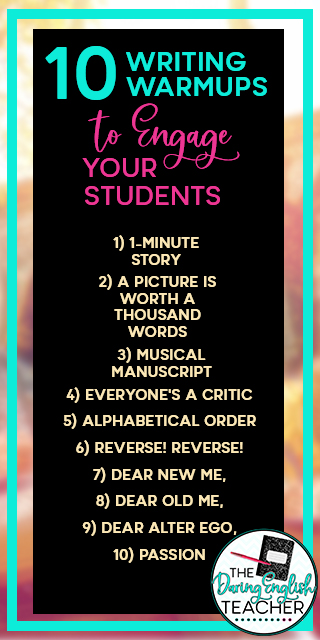
Reverse! Reverse!
If you enjoy nonsensical fun, look no further! In this exercise, you will select any word out of the English language and present it to your students. Then reverse all the letters, creating an entirely new word. Each of your students will decide the meaning of this new word, and provide a dictionary entry for it, complete with a definition and an example sentence. This is a fun little exercise that gets the creative juices flowing and lets students feel more in control of language.
Tip: To make the activity more challenging, place specific guidelines on how the word fits into the English language, i.e., “this word is a verb,” etc.
Dear New Me,
Letters are a great, low-stress activity that still helps your students practice communicating their thoughts effectively in writing. In this exercise, students will write a short message to their future selves, detailing personal goals or worries about the near future. I recommend doing this at the beginning of a new unit or even before an extended assignment/project so that students can go into the next learning experience with a more focused mindset. Self check-ins are necessary and important!
Dear Old Me,
Here’s a fun mirror of the above warm-up, in which your students will write to their past selves! This can work in a broader sense, such as writing a letter full of things they’d wish they had known when they were six. They can also use this as a reflection upon the ending of a unit or project. It can even pair with the “Dear New Me” project, resulting in a constant stream of conversation that marks each student’s progress. It’s a great way to remind students that we are all learning and growing every day.
Dear Alter Ego,
Yet another twist on letter writing: This activity is one students can engage with every day and one that allows them a snippet of fantasy to liven up the classroom. Ask your students to create an alter ego for themselves. Then set aside a few minutes at the beginning of each class for your students to write to their alter egos. Not only is this an exercise in writing, but it’s also an exercise in self-esteem. Often alter egos are who we imagine ourselves as, but fear we are too plain or weak to be. The more acquainted your students become with their alter egos, the more they will realize that they are exalting themselves and their own potential.
Everything comes out better when love is added to the mix. When you ask someone about a subject they love, it seems as if they could talk for hours. Ask your students to write down a list of things they are passionate about: This can be anything from food to a sport to a stuffed animal they always keep on their bed. Have them choose one, set the timer, and let them write! They’ll surprise themselves with how much they have to say. Some more specific questions you can use to prompt them are: Why is ___ special to you personally? When did you first become interested in ___? What are 3 facts you know about ___?
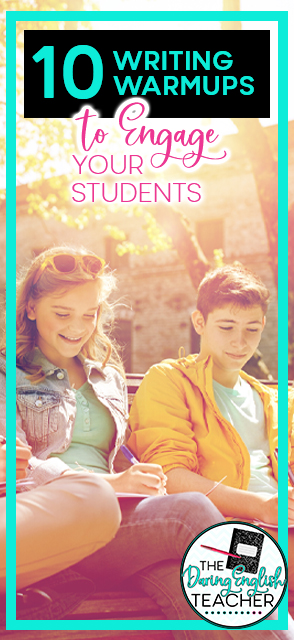
Leave a Reply Cancel reply
Your email address will not be published. Required fields are marked *
Save my name, email, and website in this browser for the next time I comment.

SUBSCRIBE NOW

10-Minute Writing Games to Play with Your Students
Jen Schneider Blog , Writing writing 1
Want some quick games to share with your students during transitions or as attention-getters. Play these fun games independently or with groups! Here are a few of my favorites 10-minute writing games to play with your students. This post uses some affiliate links. Purchases from these links result in a small commission to help sustain this site.

Word Association Game
Word association games are perfect for 10-minute writing games! Start by giving students a random word and ask them to write down the first word that comes to their mind when they hear it. Then, have them pass their paper to the person next to them and repeat the process with the new word. Set a timer for 10 minutes and see how far around the circle they can go, building off of each other’s words. This game is a blast for generating vocabulary words or words to use in future writing prompts or stories.
Writing Roulette
My students beg to play writing roulette! I give each student five different colored sticky notes (or use this FREE Jamboard template ).
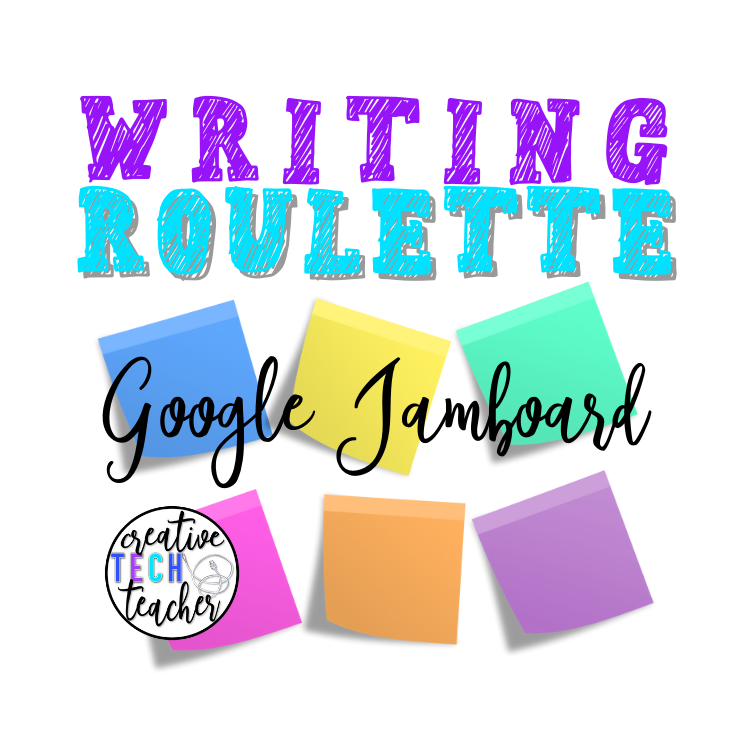
Each sticky note has a different topic. For example, here are the literary elements I use for my students. You can change these up depending on your grade level.
- Yellow: character
- Blue: quotation
- Pink: setting
- Green: conflict
- Orange: theme
Have your students each generate one of the literary elements on each colored sticky note. Make sure they write only one idea per note. Mix up the sticky notes, then give the students five sticky notes (one on each topic) to generate their own story. We LOVE sharing these with the class. As a bonus, expand on the quick stories and create a published, polished piece.
Literary Jenga
Literally playing a game when writing is so much fun! Write creative writing prompts on the sides of Jenga blocks (such as “Write a story in which the main character is an animal” or “Describe a place you’ve never been”) and stack them up. Students take turns pulling a block and then writing for 2-3 minutes based on the prompt they see. The game continues until the tower falls, and then students can read aloud what they’ve written.
Finish the Story Writing Game
This game is also called story or paper pass. I remember playing this writing game in school. I loved it then as much as I love it as a teacher! First, give students the first line of a story and have them write for 2-3 minutes. Then, have them pass their paper to the person next to them and that person continues the story for 2-3 minutes. Continue this process until everyone has contributed, and see how the story turned out in the end.
Random Word Stories
Use this random word generator to pick a fun, unique word. Have your students write a story using that word as a focus. You can have each student select their own word or use a class word.
Descriptive Writing Game
Many ELA curriculums have descriptive writing as an assessment. Why not teach descriptive writing skills with a 10-minute writing game! First, ask students to close their eyes and imagine a scene you describe to them, such as a beach or a forest. Give them 10 minutes to write a detailed description of what they see in their mind’s eye. Encourage them to use sensory language and descriptive adjectives to really paint a picture with their words. Share the stories, and as a bonus, have students illustrate their writing. You can also adapt this and share a picture as a writing prompt starter. Show students a picture or image and give them 10 minutes to write a story or poem based on what they see. Encourage them to be creative and use their imagination to build a story around the picture.
Character Creation Game
Students love creating their own characters! Have students brainstorm a character by answering questions about them, such as their name, age, occupation, likes and dislikes, fears, etc. Then, set a timer for 10 minutes and have them write a short story or scene featuring that character. You can add to the fun by having two characters team up together to create a new story or have a conversation with one another based on their characters’ backgrounds.
Six-Word Stories
Challenge students to write a complete story in just six words, such as “For sale: baby shoes, never worn.” Set a timer for 10 minutes and see how many six-word stories they can create.
Mad Libs Game
The old Mad Libs games are so much fun! I remember having paper Mad Libs books that my siblings and I giggled over with delight. Online Mad Libs games let students work independently to create funny stories. I love using Mad Libs online !
Fan Fiction
My students absolutely love writing fan fiction. This gives them a chance to explore stories on a deeper level, and change the outcomes to what they really wanted to happen in the book! Have students choose a favorite book or movie character and write a short story featuring that character in a new adventure or scenario. Set a timer for 10 minutes and see how well they can capture the voice and personality of the character in their writing.
Story Cubes
Use storytelling dice or story cubes with pictures on each side, and have students roll the dice to create a story. Set a timer for 10 minutes and challenge students to create a story that includes all of the pictures they rolled. Share the stories in small groups or with the full class.
Writing Prompts
Using writing prompts in the classroom is an effective way to encourage a love for writing in students. Here are five ways to inspire and engage middle school students:
Daily writing prompts
Start the day with a short 10-minute writing exercise that covers various genres and themes. Use this list of 25 daily prompts to get started.
Structured writing prompts
Use prompts as a starting point for more structured writing assignments such as essays or research papers. This encourages students to think critically and provides specific guidelines for the writing task. Use this list of 10 structured prompts to get started.
Group brainstorming
Encourage students to work together in small groups to generate their own writing prompts. This fosters collaboration and creativity.
Writing prompt dares
Students can create their own writing prompt dares or use these 15 writing prompt dare examples to get started. These are great for group brainstorming prompts.
Try out this 52 writing prompt workbook . You even get an editable Canva link to add your own unique prompts!

Get ready for 10-minute writing games to use in your classroom! These games can be scaffolded and differentiated for all grade levels. What writing games do you use in your classroom!
Creative writing games: A great way to unleash your creative side @
[…] technique of creative writing involves the creation of tales. The exploration of worlds, and the creation of people and situations that come to […]
Leave a Reply Cancel reply
Your email address will not be published. Required fields are marked *
Privacy Overview

10 fun writing activities for the reluctant writer
10 FUN WRITING ACTIVITIES FOR THE RELUCTANT WRITER
No doubt about it – writing isn’t easy. It is no wonder that many of our students could be described as ‘reluctant writers’ at best. It has been estimated by the National Association of Educational Progress that only about 27% of 8th and 12th-grade students can write proficiently.
As educators, we know that regular practice would go a long way to helping our students correct this underachievement, and sometimes, writing prompts just aren’t enough to light the fire.
But how do we get students, who have long since been turned off writing, to put pen to paper and log the requisite time to develop their writing chops?
The answer is to make writing fun! In this article, we will look at some creative writing activities where we can inject a little enjoyment into the writing game.

25 Fun Daily Writing Tasks
Quick Write and JOURNAL Activities for ALL TEXT TYPES in DIGITAL & PDF PRINT to engage RELUCTANT WRITERS .
⭐⭐⭐⭐⭐ ( 18 reviews )
1. Poetry Scavenger Hunt
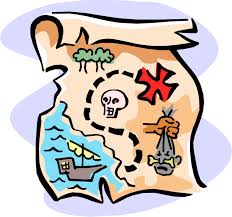
The Purpose: This activity encourages students to see the poetry in the everyday language around them while helpfully reinforcing their understanding of some of the conventions of the genre.
The Process: Encourage students to ‘scavenge’ their school, home, and outside the community for snippets of language they can compile into a piece of poetry or a poetic collage. They may copy down or photograph words, phrases, and sentences from signs, magazines, leaflets or even snippets of conversations they overhear while out and about.
Examples of language they collect may range from the Keep Out sign on private property to the destination on the front of a local bus.
Once students have gathered their language together, they can work to build a poem out of the scraps, usually choosing a central theme to give the piece cohesion. They can even include corresponding artwork to enhance the visual appeal of their work, too, if they wish.
The Prize: If poetry serves one purpose, it is to encourage us to look at the world anew with the fresh eyes of a young child. This activity challenges our students to read new meanings into familiar things and put their own spin on the language they encounter in the world around them, reinforcing the student’s grasp on poetic conventions.
2. Story Chains
The Purpose: Writing is often thought of as a solitary pursuit. For this reason alone, it can be seen as a particularly unattractive activity by many of our more gregarious students. This fun activity exercises students’ understanding of writing structures and engages them in fun, creative collaboration.
The Process: Each student starts with a blank paper and pen. The teacher writes a story prompt on the whiteboard. You’ll find some excellent narrative writing prompts here . For example, each student spends two minutes using the writing prompt to kick-start their writing.
When they have completed this part of the task, they will then pass their piece of paper to the student next to them. Students then continue the story from where the previous student left off for a given number of words, paragraphs, or length of time.
If organized correctly, you can ensure students receive their own initial story back at the end for the writing of the story’s conclusion .
The Prize: This fun writing activity can be used effectively to reinforce student understanding of narrative writing structures, but it can also be fun to try with other writing genres.
Working collaboratively motivates students to engage with the task, as no one wants to be the ‘weak link’ in the finished piece. But, more than that, this activity encourages students to see writing as a communicative and creative task where there needn’t be a ‘right’ answer. This encourages students to be more willing to take creative risks in their work.
3. Acrostic Associations
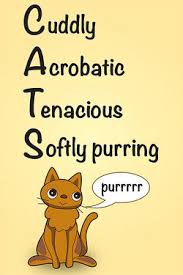
The Purpose: This is another great way to get students to try writing poetry – a genre that many students find the most daunting.
The Process: Acrostics are simple poems whereby each letter of a word or phrase begins a new line in the poem. Younger students can start off with something very simple, like their own name or their favorite pet and write this vertically down the page.
Older students can take a word or phrase related to a topic they have been working on or have a particular interest in and write it down on the page before beginning to write.
The Prize: This activity has much in common with the old psychiatrist’s word association technique. Students should be encouraged to riff on ideas and themes generated by the focus word or phrase. They needn’t worry about rhyme and meter and such here, but the preset letter for each line will give them some structure to their meanderings and require them to impose some discipline on their wordsmithery, albeit in a fun and loose manner.
4. The What If Challenge

The Purpose: This challenge helps encourage students to see the link between posing interesting hypothetical questions and creating an entertaining piece of writing.
The Process: To begin this exercise, have the students come up with a single What If question, which they can then write down on a piece of paper. The more off-the-wall, the better!
For example, ‘What if everyone in the world knew what you were thinking?’ or ‘What if your pet dog could talk?’ Students fold up their questions and drop them into a hat. Each student picks one out of the hat before writing on that question for a suitable set amount of time.
Example What If Questions
- “What if you woke up one day and found out that you had the power to time travel?”
- “What if you were the last person on Earth? How would you spend your time?”
- “What if you were granted three wishes, but each one came with a terrible consequence?”
- “What if you discovered a secret portal to another world? Where would you go, and what would you do?”
- “What if you woke up one day with the ability to communicate with animals? How would your life change?”
The Prize: Students are most likely to face the terror of the dreaded Writer’s Block when they are faced with open-ended creative writing tasks.
This activity encourages the students to see the usefulness of posing hypothetical What If questions, even random off-the-wall ones, for kick-starting their writing motors.
Though students begin by answering the questions set for them by others, please encourage them to see how they can set these questions for themselves the next time they suffer from a stalled writing engine.
5. The Most Disgusting Sandwich in the World

The Purpose: Up until now, we have looked at activities encouraging our students to have fun with genres such as fiction and poetry. These genres being imaginative in nature, more easily lend themselves to being enjoyable than some of the nonfiction genres.
But what about descriptive writing activities? In this activity, we endeavor to bring that same level of enjoyment to instruction writing while also cleverly reinforcing the criteria of this genre.
The Process: Undoubtedly, when teaching instruction writing, you will at some point cover the specific criteria of the genre with your students.
These will include things like the use of a title, numbered or bulleted points, time connectives, imperatives, diagrams with captions etc. You will then want the students to produce their own piece of instruction writing or procedural text to display their understanding of how the genre works.
But, why not try a fun topic such as How to Make the Most Disgusting Sandwich in the World rather than more obvious (and drier!) topics such as How to Tie Your Shoelaces or How to Make a Paper Airplane when choosing a topic for your students to practice their instruction writing chops?
Example of a Most Disgusting Sandwich Text
The Prize: As mentioned, with nonfiction genres, in particular, we tend to suggest more banal topics for our students to work on while internalizing the genre’s criteria. Enjoyment and acquiring practical writing skills need not be mutually exclusive.
Our students can just as quickly, if not more easily, absorb and internalize the necessary writing conventions while engaged in writing about whimsical and even nonsensical topics.
if your sandwich is entering the realm of horror, be sure to check our complete guide to writing a scary story here as well.
Daily Quick Writes For All Text Types

Our FUN DAILY QUICK WRITE TASKS will teach your students the fundamentals of CREATIVE WRITING across all text types. Packed with 52 ENGAGING ACTIVITIES
6. Diary Entry of a Future Self

The Purpose: This activity allows students to practice personal writing within diary/journal writing conventions. It also challenges them to consider what their world will be like in the future, perhaps stepping a foot into the realm of science fiction.
The Process: Straightforwardly, after working through some examples of diary or journal writing, and reviewing the various criteria of the genre, challenge the students to write an entry at a given milestone in the future.
This may be when they leave school, begin work, go to university, get married, have kids, retire, etc. You may even wish to get the students to write an entry for a series of future milestones as part of a more extended project.
Example of Message to Future Me Text
The Prize: Students will get a chance here to exercise their understanding of this type of writing , but more than that, they will also get an opportunity to exercise their imaginative muscles too. They will get to consider what shape their future world will take in this engaging thought experiment that will allow them to improve their writing too.
7. Comic Strip Script
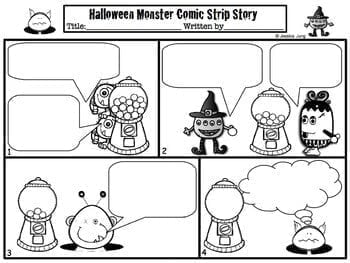
The Purpose: Give your students the chance to improve their dialogue writing skills and work on their understanding of character development in this fun activity which combines writing with a series of visual elements.
The Process: There are two ways to do this activity. The first requires you to source or create a comic strip without the dialogue the characters are speaking. This may be as straightforward as using whiteout to erase the words in speech bubbles and making copies for your students to complete.
Alternatively, provide the students with photographs/pictures and strips of cards to form their action sequences . When students have their ‘mute’ strips, they can begin to write the dialogue/script to link the panels together.
The Prize: When it comes to writing, comic strips are probably one of the easier sells to reluctant students! This activity also allows students to write for speech. This will stand to them later when they come to produce sections of dialogue in their narrative writing or when producing play or film scripts.
They will also develop their visual literacy skills as they scan the pictures for clues of tone and context before they begin their writing.
Keep It Fun
Just as we should encourage our students to read for fun and wider educational benefits, we should also work to instil similar attitudes towards writing. To do this means we must work to avoid always framing writing in the context of a chore, that bitter pill that must be swallowed for the good of our health.
There is no getting away from the fact that writing can, at times, be laborious. It is time-consuming and, for most of us, difficult at the best of times. There is a certain, inescapable amount of work involved in becoming a competent writer.
That said, as we have seen in the activities above, with a bit of creative thought, we can inject fun into even the most practical of writing activities . All that is required is a dash of imagination and a sprinkling of effort.
8. Character Interviews

The Purpose: Character interviews as writing activities are excellent for students because they encourage creative thinking, character development, and empathy. The purpose of this activity is to help students delve deeper into the minds of the characters they are creating in their stories or reading about in literature. By conducting interviews with these characters, students gain a better understanding of their personalities, motivations, and perspectives.
The Process of character interviews involves students imagining themselves as interviewers and their characters as interviewees. They can either write out the questions and answers in a script-like format or write a narrative where the character responds to the questions in their own voice.
The Prize: Through character interviews, students learn several valuable skills:
- Character Development: By exploring various aspects of their characters’ lives, backgrounds, and experiences, students can develop more well-rounded and authentic characters in their stories. This helps make their fictional creations more relatable and engaging to readers.
- Empathy and Perspective: Conducting interviews requires students to put themselves in their characters’ shoes, considering their thoughts, emotions, and struggles. This cultivates empathy and a deeper understanding of human behavior, which can be applied to real-life situations as well.
- Voice and Dialogue: In crafting the character’s responses, students practice writing authentic dialogue and giving their characters unique voices. This skill is valuable for creating dynamic and believable interactions between characters in their stories.
- Creative Expression: Character interviews provide a creative outlet for students to let their imaginations run wild. They can explore scenarios that may not appear in the main story and discover new aspects of their characters they might not have considered before.
- Critical Thinking: Formulating questions for the interview requires students to think critically about their characters’ personalities and backgrounds. This exercise enhances their analytical skills and storytelling abilities.
Overall, character interviews are a dynamic and enjoyable way for students to delve deeper into the worlds they create or the literature they read. It nurtures creativity, empathy, and writing skills, empowering students to become more proficient and imaginative writers.
9. The Travel Journal

The Purpose: Travel journal writing tasks are excellent for students as they offer a unique and immersive way to foster creativity, cultural awareness, and descriptive writing skills. The purpose of this activity is to allow students to embark on a fictional or real travel adventure, exploring new places, cultures, and experiences through the eyes of a traveller.
The process of a travel journal writing task involves students assuming the role of a traveler and writing about their journey in a journal format. They can describe the sights, sounds, tastes, and emotions they encounter during their travels. This activity encourages students to use vivid language, sensory details, and expressive writing to bring their travel experiences to life.
The Prize: Through travel journal writing tasks, students will learn several valuable skills:
- Descriptive Writing: By describing their surroundings and experiences in detail, students enhance their descriptive writing skills, creating engaging and vivid narratives.
- Cultural Awareness: Travel journals encourage students to explore different cultures, customs, and traditions. This helps broaden their understanding and appreciation of diversity.
- Empathy and Perspective: Through writing from the perspective of a traveler, students develop empathy and gain insight into the lives of people from different backgrounds.
- Research Skills: For fictional travel journals, students might research specific locations or historical periods to make their narratives more authentic and accurate.
- Reflection and Self-Expression: Travel journals offer a space for students to reflect on their own emotions, thoughts, and personal growth as they encounter new experiences.
- Creativity and Imagination: For fictional travel adventures, students get to unleash their creativity and imagination, envisioning fantastical places and scenarios.
- Language and Vocabulary: Travel journal writing tasks allow students to expand their vocabulary and experiment with expressive language.
Overall, travel journal writing tasks inspire students to become more observant, empathetic, and skilled writers. They transport them to new worlds and foster a sense of wonder and curiosity about the world around them. Whether writing about real or imaginary journeys, students develop a deeper connection to the places they encounter, making this activity both educational and enjoyable.
10. The Fairy Tale Remix

The Purpose: A fairy tale remix writing activity is a fantastic creative exercise for students as it allows them to put a unique spin on classic fairy tales, fostering imagination, critical thinking, and storytelling skills. This activity encourages students to think outside the box, reinterpret well-known tales, and explore their creative potential by transforming traditional narratives into something entirely new and exciting.
The process of a fairy tale remix writing activity involves students selecting a familiar fairy tale and altering key elements such as characters, settings, plot twists, or outcomes. They can modernize the story, change the genre, or even mix different fairy tales together to create a wholly original piece.
The Prize: Through this activity, students will learn several valuable skills:
- Creative Thinking: Students exercise their creativity by brainstorming unique concepts and ideas to remix the fairy tales, encouraging them to think imaginatively.
- Critical Analysis: Analyzing the original fairy tale to identify essential elements to keep and areas to remix helps students develop critical thinking skills and understand storytelling structures.
- Writing Techniques: Crafting a remix requires students to use descriptive language, engaging dialogue, and well-developed characters, helping them hone their writing techniques.
- Perspective and Empathy: Remixing fairy tales allows students to explore different character perspectives, promoting empathy and understanding of diverse points of view.
- Genre Exploration: Remixing fairy tales can introduce students to various genres like science fiction, fantasy, or mystery, expanding their literary horizons.
- Originality: Creating their own narrative twists and unexpected plots encourages students to take ownership of their writing and develop a unique voice.
- Storytelling: Students learn the art of compelling storytelling as they weave together familiar elements with innovative ideas, captivating their readers.
By remixing fairy tales, students embark on a creative journey that empowers them to reimagine well-loved stories while honing their writing skills and imaginative prowess. It’s an engaging and enjoyable way for students to connect with literature, explore new possibilities, and showcase their storytelling talents.
Top 5 Tips for Teaching Engaging Creative Writing Lessons
Teaching creative writing can be a thrilling discovery journey for students and educators alike. To foster a love for storytelling and unleash the imaginative prowess of your students, here are five engaging tips for your creative writing lessons:
1. Embrace Playfulness : Encourage a spirit of playfulness and experimentation in your classroom. Encourage students to explore unconventional ideas, characters, and settings. Use fun writing prompts like “What if animals could talk?” or “Imagine a world where gravity is reversed.”
2. Incorporate Visual Stimuli : Visual aids can be powerful creative catalysts. Show intriguing images or short videos to spark students’ imaginations. Ask them to describe what they see, then guide them to weave stories around these visuals. This approach can lead to unexpected and captivating narratives.
3. Encourage Peer Collaboration : Foster community and collaboration among your students. Organize group writing activities where students can brainstorm, share ideas, and build upon each other’s stories. This not only enhances creativity but also promotes teamwork and communication skills.
4. Explore Different Genres : Introduce students to various writing genres—fantasy and science fiction to mystery and historical fiction. Let them experiment with different styles and find what resonates most with their interests. Exposing students to diverse genres can broaden their horizons and inspire fresh ideas.
5. Celebrate Individuality : Encourage students to infuse unique experiences and perspectives into their writing. Provide opportunities for them to write about topics that are meaningful to them. Celebrate their voices and help them discover the power of their narratives.
Remember, the key to teaching creative writing is to create a supportive and inspiring environment where students feel empowered to take risks and explore the limitless possibilities of storytelling. By embracing these tips, you can transform your classroom into a vibrant imagination and literary exploration hub. Happy writing!
MORE FUN WRITING ACTIVITIES FOR YOU
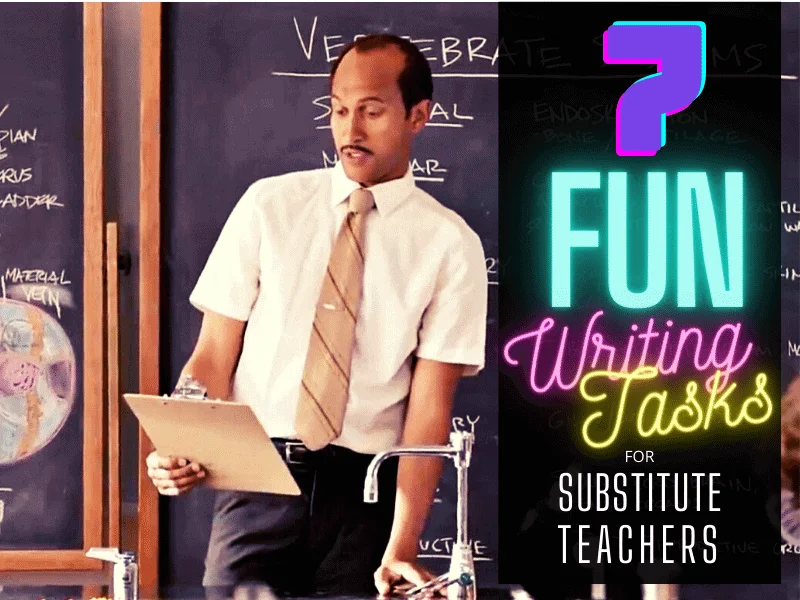
7 Fun Writing Sub Plans for Substitute Teachers

25 Fun Christmas Writing Tasks for Students
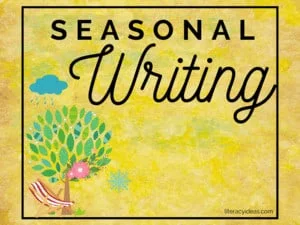
5 Fun Seasonal Writing Activities Students and Teachers Love

10 Fun Classroom Writing Games to Improve Literacy Skills
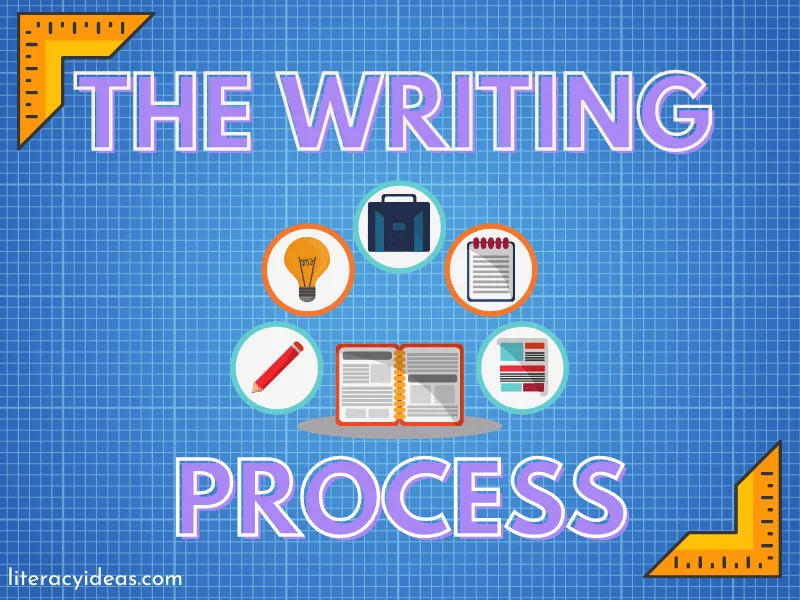
The Writing Process
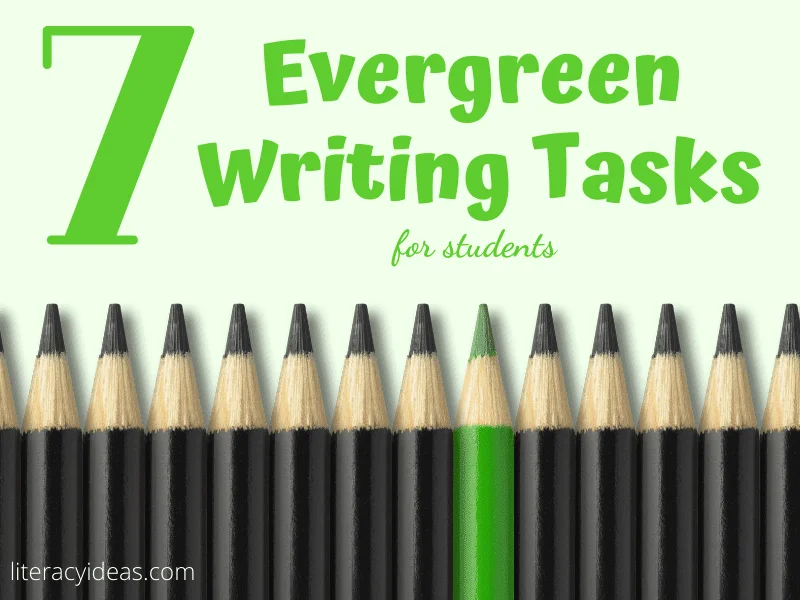
7 Evergreen Writing Activities for Elementary Students
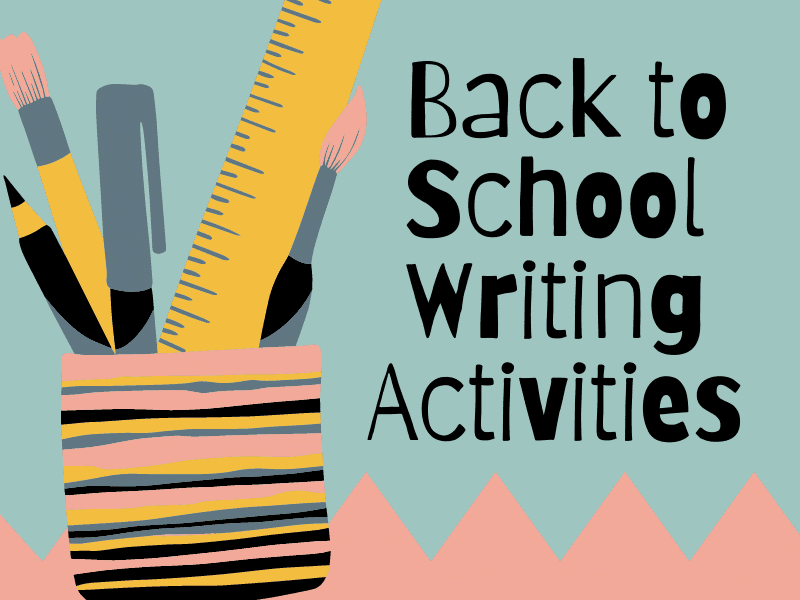
17 Fun First Day Of School Writing Activities
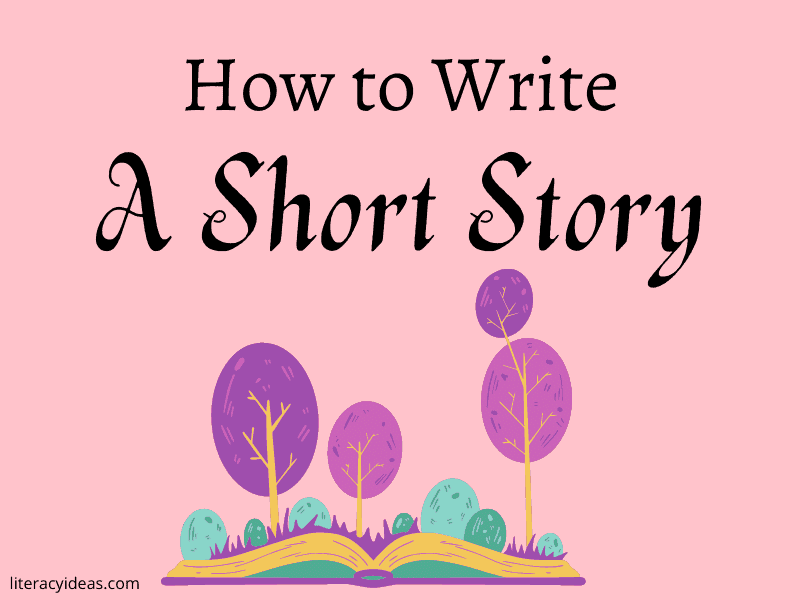
Short Story Writing for Students and Teachers
Jump to navigation
- Inside Writing
- Teacher's Guides
- Student Models
- Writing Topics
- Minilessons
- Shopping Cart
- Inside Grammar
- Grammar Adventures
- CCSS Correlations
- Infographics
Get a free Grammar Adventure! Choose a single Adventure and add coupon code ADVENTURE during checkout. (All-Adventure licenses aren’t included.)
Sign up or login to use the bookmarking feature.
5 Fun Creative Writing Activities
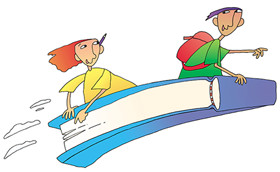
We’ve gathered five fun creative writing activities you can assign to spark a love for writing. Our hope is that these activities will create a workshop-like environment that fosters feedback and collaboration in your writing classroom.
You’ll notice that none of the activities focuses on the technical aspects of writing. Instead, the activities encourage creativity, reflection, and self-expression—hallmarks of meaningful writing.
Minilesson 1: InstaMemory
- Imagine a favorite memory as a cellphone picture.
- Finish this sentence starter: My memory snapshot shows . . .
- Keep writing until you’ve described your memory snapshot in full. Make sure to include who is in it, what is happening, where it is happening, and when it is happening. Note colors, emotions, facial expressions, and other visual details about the moment.
- Read your memory snapshot. Does your writing create a clear picture?
View Minilesson for Classroom Presentation
Minilesson 2: Back-and-Forth Stories
Writing back-and-forth stories takes a little creativity and a lot of flexibility. How long can you and a partner keep this story going?
An abandoned home sat at the top of the hill. Matt and Brianna knew the rumors about it, but they had to see it for themselves. They tiptoed their way up the steps, and when they reached the door, it swung open. Inside . . .
- Continue the story. Write for two minutes.
- Pass the story to a writing partner.
- The partner continues the story where you left off and writes for two minutes before passing the story back.
- Continue writing and passing the story every two minutes.
- How long can you keep the story going? What happens inside the house?
Minilesson 3: Four-Star Food Review
- List the food items that would make up your ideal fall meal. Include one main dish, one side dish, one dessert, and one drink.
- Describe the looks, smells, and tastes associated with the meal.
- Finish this sentence: My meal reminds me of fall, because . . .
- Use the details you’ve collected to write a review of your meal in one or two paragraphs. Exchange your review with a partner to see how your meals compare.
Minilesson 4: Now how do I get out of this one?
- List ten chores or tasks you hate doing. Cleaning my room is an example of a chore you might not like.
- Select four tasks from your list and write a creative excuse explaining why you can’t or haven’t completed each one. Make your excuses as original and wild as possible.
- When you’ve finished, exchange your work with a classmate. Read and discuss each other’s excuses.
Minilesson 5: Diary of a Famous Figure
- List three famous people or characters you like or admire.
- Imagine you are one of the famous figures from your list.
- As that person, think of what you would do on a summer day.
- Write a diary entry (or blog post) about your special day as the famous person.
- Then write additional entries as you so choose.
Want more creative writing ideas? Check out these creative activities.
Teacher Support:
Click to find out more about this resource.
Standards Correlations:
The State Standards provide a way to evaluate your students' performance.
- 110.5.b.12.A
- LAFS.3.W.1.3
- 110.5.b.11.B.i
- 110.5.b.11.B.ii
- 110.6.b.11.B
- 110.6.b.12.A
- LAFS.4.W.1.3
- 110.6.b.11.B.i
- 110.6.b.11.B.ii
- 110.7.b.12.A
- LAFS.5.W.1.3
- 110.7.b.11.B.i
- 110.7.b.11.B.ii
- 110.22.b.10
- 110.22.b.11.A
- LAFS.6.W.1.3
- 110.22.b.10.A
- 110.22.b.10.B.i
- 110.23.b.10
- 110.23.b.11.A
- LAFS.7.W.1.3
- 110.23.b.10.B.i
- 110.23.b.10.B.ii
- 110.24.b.10
- 110.24.b.11.A
- LAFS.8.W.1.3
- 110.24.b.10.B.i
- 110.24.b.10.B.ii
Related Resources
All resources.
- Drawing a Life Map
- Writing: Now how do I get out of this one?
- Writing a 5 W’s Story
- Writing Back-and-Forth Stories
- Starting Stories: 5 Great Beginning Strategies
- Writing Résumés and Cover Letters
- Practice Test for Reading and Writing Nonfiction
- Writing Narrative Arguments
- Writing Personal Essays
- Inquire Online Middle School Classroom Set
- Write Away Teacher's Guide
- Write for College Teacher's Guide
- Write for College
- Writers Express
- Writing Activities
105 Creative Writing Exercises To Get You Writing Again
You know that feeling when you just don’t feel like writing? Sometimes you can’t even get a word down on paper. It’s the most frustrating thing ever to a writer, especially when you’re working towards a deadline. The good news is that we have a list of 105 creative writing exercises to help you get motivated and start writing again!
What are creative writing exercises?
Creative writing exercises are short writing activities (normally around 10 minutes) designed to get you writing. The goal of these exercises is to give you the motivation to put words onto a blank paper. These words don’t need to be logical or meaningful, neither do they need to be grammatically correct or spelt correctly. The whole idea is to just get you writing something, anything. The end result of these quick creative writing exercises is normally a series of notes, bullet points or ramblings that you can, later on, use as inspiration for a bigger piece of writing such as a story or a poem.
Good creative writing exercises are short, quick and easy to complete. You shouldn’t need to think too much about your style of writing or how imaginative your notes are. Just write anything that comes to mind, and you’ll be on the road to improving your creative writing skills and beating writer’s block .
Use the generator below to get a random creative writing exercise idea:
List of 105+ Creative Writing Exercises
Here are over 105 creative writing exercises to give your brain a workout and help those creative juices flow again:
- Set a timer for 60 seconds. Now write down as many words or phrases that come to mind at that moment.
- Pick any colour you like. Now start your sentence with this colour. For example, Orange, the colour of my favourite top.
- Open a book or dictionary on a random page. Pick a random word. You can close your eyes and slowly move your finger across the page. Now, write a paragraph with this random word in it. You can even use an online dictionary to get random words:
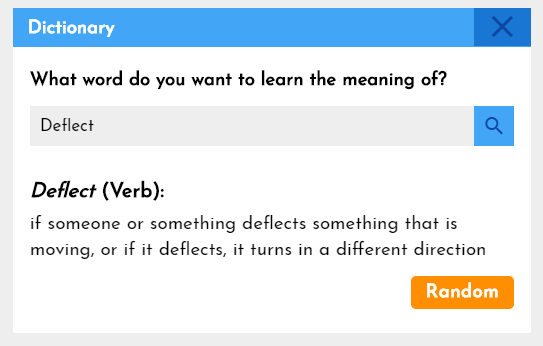
- Create your own alphabet picture book or list. It can be A to Z of animals, food, monsters or anything else you like!
- Using only the sense of smell, describe where you are right now.
- Take a snack break. While eating your snack write down the exact taste of that food. The goal of this creative writing exercise is to make your readers savour this food as well.
- Pick a random object in your room and write a short paragraph from its point of view. For example, how does your pencil feel? What if your lamp had feelings?
- Describe your dream house. Where would you live one day? Is it huge or tiny?
- Pick two different TV shows, movies or books that you like. Now swap the main character. What if Supergirl was in Twilight? What if SpongeBob SquarePants was in The Flash? Write a short scene using this character swap as inspiration.
- What’s your favourite video game? Write at least 10 tips for playing this game.
- Pick your favourite hobby or sport. Now pretend an alien has just landed on Earth and you need to teach it this hobby or sport. Write at least ten tips on how you would teach this alien.
- Use a random image generator and write a paragraph about the first picture you see.
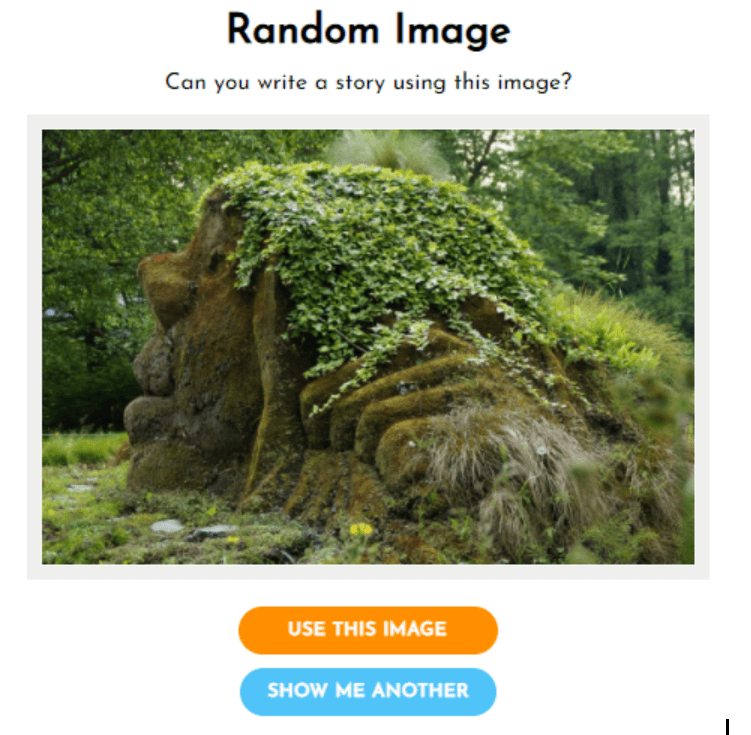
- Write a letter to your favourite celebrity or character. What inspires you most about them? Can you think of a memorable moment where this person’s life affected yours? We have this helpful guide on writing a letter to your best friend for extra inspiration.
- Write down at least 10 benefits of writing. This can help motivate you and beat writer’s block.
- Complete this sentence in 10 different ways: Patrick waited for the school bus and…
- Pick up a random book from your bookshelf and go to page 9. Find the ninth sentence on that page. Use this sentence as a story starter.
- Create a character profile based on all the traits that you hate. It might help to list down all the traits first and then work on describing the character.
- What is the scariest or most dangerous situation you have ever been in? Why was this situation scary? How did you cope at that moment?
- Pretend that you’re a chat show host and you’re interviewing your favourite celebrity. Write down the script for this conversation.
- Using extreme detail, write down what you have been doing for the past one hour today. Think about your thoughts, feelings and actions during this time.
- Make a list of potential character names for your next story. You can use a fantasy name generator to help you.
- Describe a futuristic setting. What do you think the world would look like in 100 years time?
- Think about a recent argument you had with someone. Would you change anything about it? How would you resolve an argument in the future?
- Describe a fantasy world. What kind of creatures live in this world? What is the climate like? What everyday challenges would a typical citizen of this world face? You can use this fantasy world name generator for inspiration.
- At the flip of a switch, you turn into a dragon. What kind of dragon would you be? Describe your appearance, special abilities, likes and dislikes. You can use a dragon name generator to give yourself a cool dragon name.
- Pick your favourite book or a famous story. Now change the point of view. For example, you could rewrite the fairytale , Cinderella. This time around, Prince Charming could be the main character. What do you think Prince Charming was doing, while Cinderella was cleaning the floors and getting ready for the ball?
- Pick a random writing prompt and use it to write a short story. Check out this collection of over 300 writing prompts for kids to inspire you.
- Write a shopping list for a famous character in history. Imagine if you were Albert Einstein’s assistant, what kind of things would he shop for on a weekly basis?
- Create a fake advertisement poster for a random object that is near you right now. Your goal is to convince the reader to buy this object from you.
- What is the worst (or most annoying) sound that you can imagine? Describe this sound in great detail, so your reader can understand the pain you feel when hearing this sound.
- What is your favourite song at the moment? Pick one line from this song and describe a moment in your life that relates to this line.
- You’re hosting an imaginary dinner party at your house. Create a list of people you would invite, and some party invites. Think about the theme of the dinner party, the food you will serve and entertainment for the evening.
- You are waiting to see your dentist in the waiting room. Write down every thought you are having at this moment in time.
- Make a list of your greatest fears. Try to think of at least three fears. Now write a short story about a character who is forced to confront one of these fears.
- Create a ‘Wanted’ poster for a famous villain of your choice. Think about the crimes they have committed, and the reward you will give for having them caught.
- Imagine you are a journalist for the ‘Imagine Forest Times’ newspaper. Your task is to get an exclusive interview with the most famous villain of all time. Pick a villain of your choice and interview them for your newspaper article. What questions would you ask them, and what would their responses be?
- In a school playground, you see the school bully hurting a new kid. Write three short stories, one from each perspective in this scenario (The bully, the witness and the kid getting bullied).
- You just won $10 million dollars. What would you spend this money on?
- Pick a random animal, and research at least five interesting facts about this animal. Write a short story centred around one of these interesting facts.
- Pick a global issue that you are passionate about. This could be climate change, black lives matters, women’s rights etc. Now create a campaign poster for this global issue.
- Write an acrostic poem about an object near you right now (or even your own name). You could use a poetry idea generator to inspire you.
- Imagine you are the head chef of a 5-star restaurant. Recently the business has slowed down. Your task is to come up with a brand-new menu to excite customers. Watch this video prompt on YouTube to inspire you.
- What is your favourite food of all time? Imagine if this piece of food was alive, what would it say to you?
- If life was one big musical, what would you be singing about right now? Write the lyrics of your song.
- Create and describe the most ultimate villain of all time. What would their traits be? What would their past look like? Will they have any positive traits?
- Complete this sentence in at least 10 different ways: Every time I look out of the window, I…
- You have just made it into the local newspaper, but what for? Write down at least five potential newspaper headlines . Here’s an example, Local Boy Survives a Deadly Illness.
- If you were a witch or a wizard, what would your specialist area be and why? You might want to use a Harry Potter name generator or a witch name generator for inspiration.
- What is your favourite thing to do on a Saturday night? Write a short story centred around this activity.
- Your main character has just received the following items: A highlighter, a red cap, a teddy bear and a fork. What would your character do with these items? Can you write a story using these items?
- Create a timeline of your own life, from birth to this current moment. Think about the key events in your life, such as birthdays, graduations, weddings and so on. After you have done this, you can pick one key event from your life to write a story about.
- Think of a famous book or movie you like. Rewrite a scene from this book or movie, where the main character is an outsider. They watch the key events play out, but have no role in the story. What would their actions be? How would they react?
- Three very different characters have just won the lottery. Write a script for each character, as they reveal the big news to their best friend.
- Write a day in the life story of three different characters. How does each character start their day? What do they do throughout the day? And how does their day end?
- Write about the worst experience in your life so far. Think about a time when you were most upset or angry and describe it.
- Imagine you’ve found a time machine in your house. What year would you travel to and why?
- Describe your own superhero. Think about their appearance, special abilities and their superhero name. Will they have a secret identity? Who is their number one enemy?
- What is your favourite country in the world? Research five fun facts about this country and use one to write a short story.
- Set yourself at least three writing goals. This could be a good way to motivate yourself to write every day. For example, one goal might be to write at least 150 words a day.
- Create a character description based on the one fact, three fiction rule. Think about one fact or truth about yourself. And then add in three fictional or fantasy elements. For example, your character could be the same age as you in real life, this is your one fact. And the three fictional elements could be they have the ability to fly, talk in over 100 different languages and have green skin.
- Describe the perfect person. What traits would they have? Think about their appearance, their interests and their dislikes.
- Keep a daily journal or diary. This is a great way to keep writing every day. There are lots of things you can write about in your journal, such as you can write about the ‘highs’ and ‘lows’ of your day. Think about anything that inspired you or anything that upset you, or just write anything that comes to mind at the moment.
- Write a book review or a movie review. If you’re lost for inspiration, just watch a random movie or read any book that you can find. Then write a critical review on it. Think about the best parts of the book/movie and the worst parts. How would you improve the book or movie?
- Write down a conversation between yourself. You can imagine talking to your younger self or future self (i.e. in 10 years’ time). What would you tell them? Are there any lessons you learned or warnings you need to give? Maybe you could talk about what your life is like now and compare it to their life?
- Try writing some quick flash fiction stories . Flash fiction is normally around 500 words long, so try to stay within this limit.
- Write a six-word story about something that happened to you today or yesterday. A six-word story is basically an entire story told in just six words. Take for example: “Another football game ruined by me.” or “A dog’s painting sold for millions.” – Six-word stories are similar to writing newspaper headlines. The goal is to summarise your story in just six words.
- The most common monsters or creatures used in stories include vampires, werewolves , dragons, the bigfoot, sirens and the loch-ness monster. In a battle of intelligence, who do you think will win and why?
- Think about an important event in your life that has happened so far, such as a birthday or the birth of a new sibling. Now using the 5 W’s and 1 H technique describe this event in great detail. The 5 W’s include: What, Who, Where, Why, When and the 1 H is: How. Ask yourself questions about the event, such as what exactly happened on that day? Who was there? Why was this event important? When and where did it happen? And finally, how did it make you feel?
- Pretend to be someone else. Think about someone important in your life. Now put yourself into their shoes, and write a day in the life story about being them. What do you think they do on a daily basis? What situations would they encounter? How would they feel?
- Complete this sentence in at least 10 different ways: I remember…
- Write about your dream holiday. Where would you go? Who would you go with? And what kind of activities would you do?
- Which one item in your house do you use the most? Is it the television, computer, mobile phone, the sofa or the microwave? Now write a story of how this item was invented. You might want to do some research online and use these ideas to build up your story.
- In exactly 100 words, describe your bedroom. Try not to go over or under this word limit.
- Make a top ten list of your favourite animals. Based on this list create your own animal fact file, where you provide fun facts about each animal in your list.
- What is your favourite scene from a book or a movie? Write down this scene. Now rewrite the scene in a different genre, such as horror, comedy, drama etc.
- Change the main character of a story you recently read into a villain. For example, you could take a popular fairytale such as Jack and the Beanstalk, but this time re-write the story to make Jack the villain of the tale.
- Complete the following sentence in at least 10 different ways: Do you ever wonder…
- What does your name mean? Research the meaning of your own name, or a name that interests you. Then use this as inspiration for your next story. For example, the name ‘Marty’ means “Servant Of Mars, God Of War”. This could make a good concept for a sci-fi story.
- Make a list of three different types of heroes (or main characters) for potential future stories.
- If someone gave you $10 dollars, what would you spend it on and why?
- Describe the world’s most boring character in at least 100 words.
- What is the biggest problem in the world today, and how can you help fix this issue?
- Create your own travel brochure for your hometown. Think about why tourists might want to visit your hometown. What is your town’s history? What kind of activities can you do? You could even research some interesting facts.
- Make a list of all your favourite moments or memories in your life. Now pick one to write a short story about.
- Describe the scariest and ugliest monster you can imagine. You could even draw a picture of this monster with your description.
- Write seven haikus, one for each colour of the rainbow. That’s red, orange, yellow, green, blue, indigo and violet.
- Imagine you are at the supermarket. Write down at least three funny scenarios that could happen to you at the supermarket. Use one for your next short story.
- Imagine your main character is at home staring at a photograph. Write the saddest scene possible. Your goal is to make your reader cry when reading this scene.
- What is happiness? In at least 150 words describe the feeling of happiness. You could use examples from your own life of when you felt happy.
- Think of a recent nightmare you had and write down everything you can remember. Use this nightmare as inspiration for your next story.
- Keep a dream journal. Every time you wake up in the middle of the night or early in the morning you can quickly jot down things that you remember from your dreams. These notes can then be used as inspiration for a short story.
- Your main character is having a really bad day. Describe this bad day and the series of events they experience. What’s the worst thing that could happen to your character?
- You find a box on your doorstep. You open this box and see the most amazing thing ever. Describe this amazing thing to your readers.
- Make a list of at least five possible settings or locations for future stories. Remember to describe each setting in detail.
- Think of something new you recently learned. Write this down. Now write a short story where your main character also learns the same thing.
- Describe the most beautiful thing you’ve ever seen in your whole life. Your goal is to amaze your readers with its beauty.
- Make a list of things that make you happy or cheer you up. Try to think of at least five ideas. Now imagine living in a world where all these things were banned or against the law. Use this as inspiration for your next story.
- Would you rather be rich and alone or poor and very popular? Write a story based on the lives of these two characters.
- Imagine your main character is a Librarian. Write down at least three dark secrets they might have. Remember, the best secrets are always unexpected.
- There’s a history behind everything. Describe the history of your house. How and when was your house built? Think about the land it was built on and the people that may have lived here long before you.
- Imagine that you are the king or queen of a beautiful kingdom. Describe your kingdom in great detail. What kind of rules would you have? Would you be a kind ruler or an evil ruler of the kingdom?
- Make a wish list of at least three objects you wish you owned right now. Now use these three items in your next story. At least one of them must be the main prop in the story.
- Using nothing but the sense of taste, describe a nice Sunday afternoon at your house. Remember you can’t use your other senses (i.e see, hear, smell or touch) in this description.
- What’s the worst pain you felt in your life? Describe this pain in great detail, so your readers can also feel it.
- If you were lost on a deserted island in the middle of nowhere, what three must-have things would you pack and why?
- Particpate in online writing challenges or contests. Here at Imagine Forest, we offer daily writing challenges with a new prompt added every day to inspire you. Check out our challenges section in the menu.
Do you have any more fun creative writing exercises to share? Let us know in the comments below!
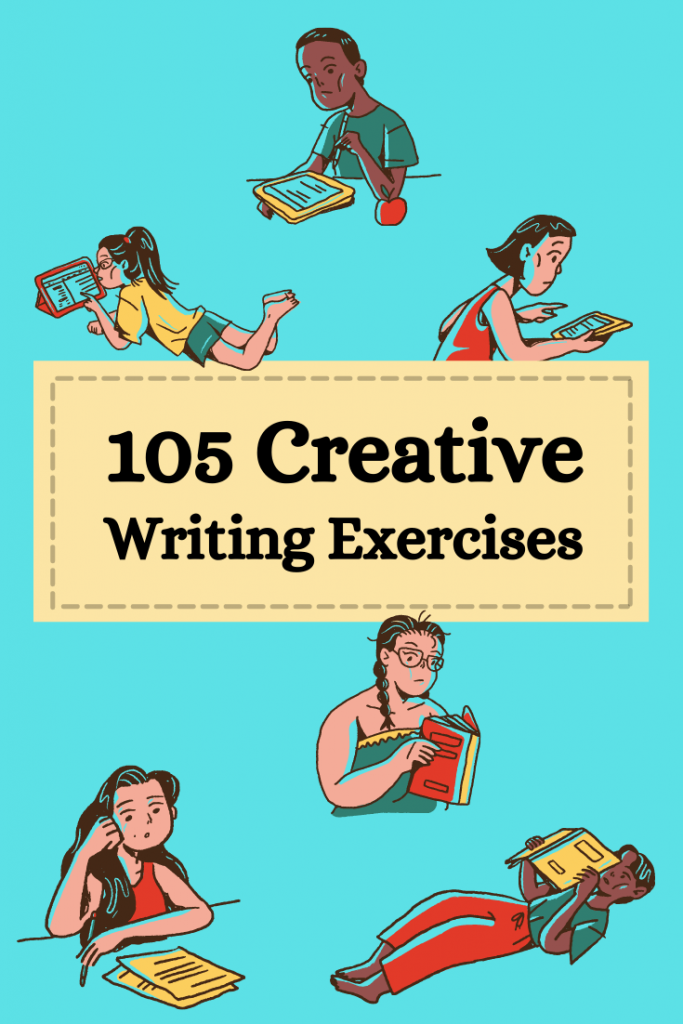
Marty the wizard is the master of Imagine Forest. When he's not reading a ton of books or writing some of his own tales, he loves to be surrounded by the magical creatures that live in Imagine Forest. While living in his tree house he has devoted his time to helping children around the world with their writing skills and creativity.
Related Posts

Comments loading...
- International
- Education Jobs
- Schools directory
- Resources Education Jobs Schools directory News Search

First Day Jitters Face - Back To School Reading & Writing Activity - First Day Of School Activities
Subject: Whole school
Age range: 5-7
Resource type: Worksheet/Activity
Last updated
2 September 2024
- Share through email
- Share through twitter
- Share through linkedin
- Share through facebook
- Share through pinterest

Welcome students back to school with a fun and engaging activity designed to ease those first-day jitters! The “First Day Jitters Face” activity is a perfect way to help students express their emotions and start the school year on a positive note. This creative back-to-school activity encourages students to draw or craft a face that represents how they feel on the first day of school. Whether it’s excitement, nervousness, or a mix of both, this activity provides a safe space for students to share their feelings.
Ideal for easing anxiety and fostering a sense of community, the “First Day Jitters Face” activity can be used in classrooms from Kindergarten through middle school. It’s a great icebreaker that allows teachers to connect with their students and for classmates to get to know each other. This activity not only supports social-emotional learning but also sparks creativity, making it an excellent addition to your first day of school plans. Make the transition back to school smoother with this engaging and meaningful activity that students will love!
Tes paid licence How can I reuse this?
Your rating is required to reflect your happiness.
It's good to leave some feedback.
Something went wrong, please try again later.
This resource hasn't been reviewed yet
To ensure quality for our reviews, only customers who have purchased this resource can review it
Report this resource to let us know if it violates our terms and conditions. Our customer service team will review your report and will be in touch.
Not quite what you were looking for? Search by keyword to find the right resource:

IMAGES
VIDEO
COMMENTS
Whatever the case may be, these 20 creative writing activities for middle school will have all of your students showing their creative prowess. 1. I Am From . After reading the poem "Where I'm From" by George Ella Lyon, have students write their own "I Am From" poems. Using a template, all students will be able to create wonderful ...
Keep reading for a free printable writing pack for middle schoolers as well! Here is a quick generator that will generate a random middle school prompt for you: Click the 'Random' button to get a random middle school writing prompt. Random. For more fun writing ideas, check out this list of over 300 writing prompt for kids.
Writing Activities for Middle School. The six types of writing are descriptive, expository, persuasive, technical, and poetic. (I know, I know, your middle schooler is nodding off already.) The truth is these writing types can be enjoyable if you have some fun topic ideas. Not only does it make writing fun, but it also gives students a chance ...
Hopefully, these creative writing prompts for middle school have given you tons of new inspiration for your next class project. Whether you're writing short stories, flash fiction, or novels, working from a sentence starter or writing prompt is a fun way to spark ideas. Sign Up for Your FREE Printable Story Starters and Writing Prompts.
With about 180 school days, this mega list of prompts could last nearly two school years without repeating! As a middle school teacher striving to make writing fun while also pushing my students to think deeper, stretch their perspectives, and grow their skills, I appreciate prompts tuned specifically to 11-14 year olds on topics that resonate ...
Lacking inspiration for a middle school writing project? Get your pencil moving with 100 varied creative prompts for narrative, informational, argument, and poetry writing. ... 100 Creative Writing Prompts for Middle School By Jennifer Gunner, M.Ed. Education , Senior Writer . Updated May 19, 2021 Image Credits.
Persuasive Writing Prompts for Middle School Students. These persuasive writing prompts are designed to inspire middle school students to develop arguments and persuade readers about a particular viewpoint or idea. These prompts will encourage critical thinking and research skills and enable students to present and justify their opinions clearly.
100 Writing Prompts for Middle School (Continued) List #2 has 30+ of the 100 writing prompts for middle school writers and is a bit more in-depth compared to List #1. Wonderfully, the two lists contrast each other and provide unique, distinct writing experiences for your students.
Go on a five-senses scavenger hunt. Find three items for each sense. Create a story using the items you found. Create a story around an interesting picture ( try these fun picture writing prompts!) Find an ad in a magazine or elsewhere and rewrite the description to convince people NOT to buy the advertised item.
Tips for Using Prompts: Be Flexible: Allow students to interpret the prompts in their own way. There are no right or wrong answers. Incorporate Visuals: Use pictures or objects related to the prompts to stimulate imagination. Make it Fun: Turn it into a game or challenge, such as a "story of the day" or "writing marathon.".
Creative Writing Activity Packet. Creative Writing Activity Packet. tha. are simple, engaging, and fun. While students are at home, their imaginations are stil. active and can f. ourish with a little prompting. The following activities require nothing m. re than a pencil and paper, can be done alone or in pairs/groups, and are app.
Here are 10 of our favorite story telling activities that inspire students: 1. Write an "I am from" poem. Students read the poem "I am From" by George Ella Lyon. Then, they draft a poem about their own identity in the same format Lyon used. Finally, students create a video to publish their poems.
These writing activities for middle-school kids can help them improve their skills and channel creativity. Try out a writing activity yourself too!
flexible creative writing activities for elementary, middle, or high school; Adjustments you may want to make: you can also use these as a "fast finisher" prompt or a warm up. incorporate them into your creative writing class. perfect for the end of the school year or before a break begins; students can trade story starters and start over.
Creative writing exercises are a fun and interesting way to improve your writing skill. Keep reading to find exercises for middle school students that will inspire poetry, plays and short stories.
This extension activity rolls art and creative writing into one! Your students will have fun coming up with dialogue for each of the different crayons and you could even make it into a fun display for your classroom walls! Learn More: Buggy And Buddy. 19. Dialogue Pictures. Personalizing writing activities always makes it more engaging for kids!
Writing isn't all fairy tales and short stories — it's also an important part of learning in middle school, high school and college. Use these academic writing activities to help students understand proper essay structure, grammar and more. 10. Story chains. Great for: Grades 4 to 8
Here are 10 writing warm-ups to build your students' writing confidence: 1 Minute Story. Get your students in the habit of writing from the word "go." Set the time for 60 seconds and task them with writing a complete short story with a beginning, middle, and end in that time.
Meaningful and engaging writing assignments include a dash of real-world, relevant writing opportunities, a pinch of skill transfer, and a sprinkling of creative freedom. Let's elevate students' writing experiences while meeting standards. But, don't forget to balance tough, academic-style writing with some more flexible options that will ...
Using writing prompts in the classroom is an effective way to encourage a love for writing in students. Here are five ways to inspire and engage middle school students: Daily writing prompts. Start the day with a short 10-minute writing exercise that covers various genres and themes. Use this list of 25 daily prompts to get started.
7. Comic Strip Script. The Purpose: Give your students the chance to improve their dialogue writing skills and work on their understanding of character development in this fun activity which combines writing with a series of visual elements. The Process: There are two ways to do this activity.
Minilesson 1: InstaMemory. Imagine a favorite memory as a cellphone picture. Finish this sentence starter: My memory snapshot shows . . . Keep writing until you've described your memory snapshot in full. Make sure to include who is in it, what is happening, where it is happening, and when it is happening.
Here are over 105 creative writing exercises to give your brain a workout and help those creative juices flow again: Set a timer for 60 seconds. Now write down as many words or phrases that come to mind at that moment. Pick any colour you like. Now start your sentence with this colour.
Welcome students back to school with a fun and engaging activity designed to ease those first-day jitters! ... The "First Day Jitters Face" activity is a perfect way to help students express their emotions and start the school year on a positive note. This creative back-to-school activity encourages students to draw or craft a face that ...